By Alan Mattli
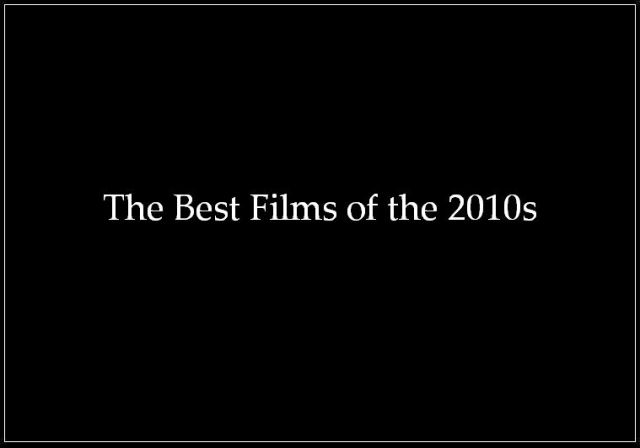
I’ve been looking forward to compiling my “Best Films of the Decade” list pretty much since the first days of 2010, after I, still in the early stages of my life as a film critic, had seen these kinds of lists posted about the 2000s – a ritual I couldn’t in good conscience take part in because, well, I was eight years old at the turn of the millennium and I never had done the necessary catching-up. I still haven’t, for that matter.
So I am thrilled to finally be able to present my selection of the best films of the 2010s – a compendium of 100 works that stuck in my mind, that haunted me, that moved me, that I still passionately rewatch. And as is often the case with lists, this one, too, would probably look vastly different if I were to present it on another day, so this selection and especially the individual placements are but snapshots in time.
Finally, I originally intended for this list to consist of only 25 titles, but that proved too much of a massacre of darlings, so I expanded the number to 50 – and arrived at the exact same conclusion. Thus, I eventually settled on 100 films from the years between 2010 and 2019 – again with a lot of agonising – which I am counting down below, hopeful that it might prompt some readers to catch up on one or two they have missed. This, then, is the ultimate aim of this list, beyond my own personal enjoyment: each entry is an empathetic recommendation, so if you want to catch up on the cinematic gems of the 2010s, this is a good place to start.
THE BEST FILMS OF THE DECADE

The Hunger Games
Directed by Gary Ross and Francis Lawrence (2012–2015)
By the standards of a blockbuster series adapted from a bestselling YA book trilogy, The Hunger Games is much more radical than people like to give it credit for. Over three films – Gary Ross’ eponymous opening chapter (2012), followed by Catching Fire (2013) and the two-part Mockingjay (2014/2015), all helmed by Francis Lawrence – Jennifer Lawrence’s steely heroine has to navigate the murderous rituals and tricky politics of a dystopian regime that has its downtrodden subjects harvest and produce goods for the wealthy Capitol. Not only are these highly efficient science-fiction adventure dramas; they offer thoughtful and genuinely subversive critiques of systemic oppression and the corrupting nature of power.

Cameraperson
Directed by Kirsten Johnson (2016)
Documentarian and cinematographer Kirsten Johnson’s approach to telling the story of her professional life is as engrossing as it is deceptively simple. In lieu of a traditional narrative, she condenses her career into a fascinating collage of moments, scenes, and B-roll footage from the countless and impressively varied projects she’s worked on since the 1990s. From slice-of-life impressions of post-war Bosnia to accompanying Citizenfour director Laura Poitras to Edward Snowden’s Hong Kong hotel room, Johnson reframes her invisible presence behind the camera to remind us that the camera eye is always a human eye as well.
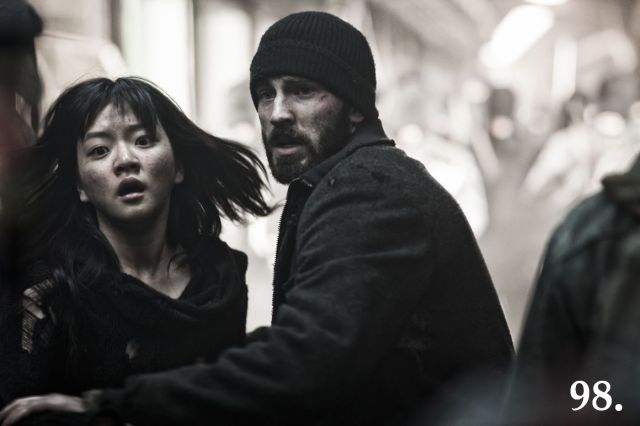
Snowpiercer
Directed by Bong Joon-ho (2013)
Cloaked in the air of a straightforward story about social upheaval and revolution, the English-language debut of South Korean director Bong Joon-ho radically flips the script: set in the eponymous train circling a frozen Earth, Snowpiercer is a brusquely radical – and delightfully strange – call to not just reform but tear down corrupt and oppressive systems. It’s a message that feels more at home in the later, more ideologically forward 2010s than in the cautiously optimistic afterglow of Barack Obama’s re-election – and which thus serves as more proof that Bong is among the most visionary directors working today.

The Burial of Kojo
Directed by Blitz Bazawule (2018)
Ghanaian hip-hop artist and filmmaker Samuel “Blitz” Bazawule marked his feature debut with this visually engrossing, emotionally resonant magical-realist ghost story that runs the gamut from invoking tribal tradition to commenting on the effects of Chinese “investments” (read: neo-colonialism) in Africa. As Western distributors and audiences are still hesitant to embrace African cinema, The Burial of Kojo, which is available for rent on Vimeo, is a potent reminder of what we are missing if we don’t bother to look.

Black Panther
Directed by Ryan Coogler (2018)
The best entry into the Marvel Cinematic Universe to date is, unsurprisingly, also the only film from that particular canon to make this list – and it does so for its inventive spin on Afrofuturism, its evocative use of music and colour, and its unabashedly blunt invocation of slavery and the Middle Passage. It’s an enrichment not just for the MCU but also for blockbuster cinema at large, which, in the long run, will hopefully be able to look back on Black Panther as a pop-cultural touchstone that helped point the way to a more diverse Hollywood.

Loveless
Directed by Andrey Zvyagintsev (2017)
It’s fitting that Loveless was originally supposed to be a reworking of Ingmar Bergman’s 1973 miniseries Scenes from a Marriage, as Andrey Zvyagintsev’s deeply affecting drama about a child’s disappearance is steeped in the surgical and clear-eyed sobriety of Bergman’s work. As much an indictment of the atomisation of Russian society as a hauntingly bleak vision of a world devoid of love, Loveless is extremely tough to watch, like a cautionary tale that hits a little bit too close to home.

Breathing
Directed by Karl Markovics (2011)
Karl Markovics has been an acting mainstay of German-language – and specifically Austrian – cinema for almost 30 years, so he was able to draw on plenty of exposure to that school of filmmaking when he made his directing debut in 2011. But Breathing is remarkable not least for the way it distinguishes itself from the style of more established Austrian directors like Michael Haneke, Ulrich Seidl, Paul Harather, or Wolfgang Murnberger: eschewing their trademark ironic detachment in favour of a more obviously empathetic realism that feels inspired by British cinema, Markovics’ story of a juvenile delinquent’s work placement at an undertaker’s delivers one of the decade’s best, most idiosyncratic coming-of-age films.

Strong Island
Directed by Yance Ford (2017)
Few films manage to capture the insidiousness of structural racism as graphically as Yance Ford’s Strong Island. Built around the 1992 murder of Ford’s brother and an all-white grand jury’s subsequent refusal to try the case, the documentary expands into an enthralling narrative about the long-term consequences of this trauma, painting a dire, and undeniably necessary, picture of how racism both underpins and cancerously corrodes civil society.

Personal Shopper
Directed by Olivier Assayas (2016)
Apart from a few jump scare-heavy horror films (Unfriended, Friend Request), post-2010 cinema has been slow to make much of the obvious connection between the notion of a spirit realm and the digital world, which might be why Personal Shopper still feels refreshingly contemporary three years after its release. Carried by one of Kristen Stewart’s best performances to date, Olivier Assayas’ multi-layered horror drama about a young medium’s search for her dead twin brother’s ghost – and her struggle to keep her day job boss happy – cannily crosses the metaphysical with the mundane, casting digital connections as the unifying plane between the two. The results are puzzling, haunting, and unfailingly fascinating.

Toy Story 3
Directed by Lee Unkrich (2010)
When Toy Story 3 first came out, it seemed like confirmation that outside of the Cars franchise, Pixar could do no wrong. This obviously seems like unreflected hyperbole now – The Good Dinosaur (2015) definitely saw to that – but it does not take away from Toy Story 3‘s undeniable excellence. Eleven years after Toy Story 2, it capped an all but perfect trilogy with a rousing, impressively animated, and typically hilarious adventure, whose tear-inducing finale forced a sizeable section of Millennials to come to terms with the end of their childhood.

mother!
Directed by Darren Aronofsky (2017)
Of the three features Darren Aronofsky directed this decade, mother! is certainly the most challenging one – a biblical allegory with murky gender dynamics and grisly violence that has much less in common with Aronofsky’s most acclaimed works (Requiem for a Dream, Black Swan) than with such comparatively maligned films as 2006’s The Fountain or the Old Testament-themed 2014 fantasy epic Noah. And yet, this polarising psychological horror trip does not court controversy for its own sake. Rather, Aronofsky is genuinely and uncompromisingly invested in trying to read the Bible against the grain and to cinematically engage and wrestle with its most troubling aspects, making mother! one of the most successful attempts by a filmmaker to channel the spirit of Luis Buñuel.

My Life as a Courgette
Directed by Claude Barras (2016)
93 years after the first animated feature film, animation still struggles to be widely recognised as a medium that does not merely cater to children. In 2016, the Swiss-French co-production My Life as a Courgette provided further evidence for how limiting that notion is. Working from a brilliant script by Céline Sciamma, director Claude Barras tells a children’s story in an aesthetic reminiscent of children’s drawings – but beneath the child-friendly veneer, there lies a narrative imbued with tragedy and trauma, like a stop-motion take on François Truffaut’s 400 Blows (1959). At just 65 minutes, it’s a brief affair, but the emotional depths it uncovers are considerable.

Kedi
Directed by Ceyda Torun (2016)
Ceyda Torun’s deeply empathetic portrait of Istanbul’s semi-feral cats and the people who love and care for them might at first glance look like a perfectly engineered ploy to pander to the cat-loving Internet. What Kedi delivers, however, is much more profound, in fact – a soulful, heartening and, let’s face it, devastatingly adorable paean to the good in humanity and the simple pleasure of petting a cat.

Cosmopolis
Directed by David Cronenberg (2012)
The wordy, stretch limousine-set adaptation of Don DeLillo’s novel of the same name did not enthuse critics back in 2012, who mostly dismissed it as a impenetrably cumbersome comment on the waning Occupy Wall Street movement. It may partially be that, but David Cronenberg transcends the politics of the day here, offering instead a mindbending satire about the emptiness undergirding the Wall Street ethos. In that way, much like Snowpiercer (2013), Cosmopolis helped lay the groundwork for the decade’s eventual surge in anti-capitalist films.
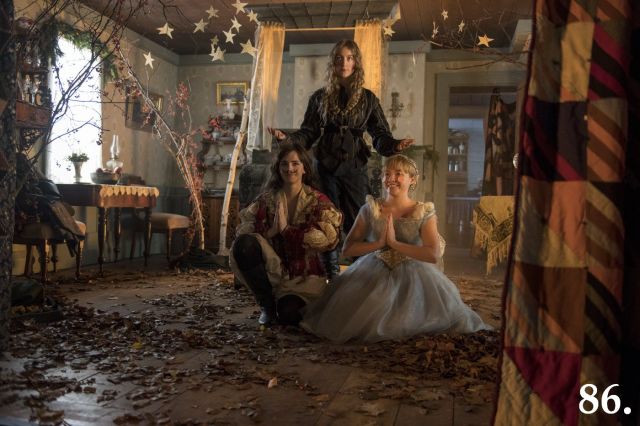
Little Women
Directed by Greta Gerwig (2019)
It can’t be often that a novel’s eighth screen incarnation yields new insights into the material, but that is exactly what Greta Gerwig’s sophomore solo directing effort achieves. Lending Louisa May Alcott’s 1868 classic Little Women a decidedly modern sensibility without erasing the realities of its historical context, Gerwig delivers dynamic and whip-smart historical cinema that balances pathos and emotion with an infectious sense of fun and – given the film’s copious winter scenes – holiday cheer.

Silence
Directed by Martin Scorsese (2016)
Arguably one of the best Christian films ever made, Martin Scorsese’s long-standing passion project – an adaptation of Shūsaku Endō’s historical novel about two Jesuit priests’ mission to fervently anti-Christian Japan in the 1640s – is not an easy work to engage with. Over the course of two-and-a-half mesmerising hours, Silence raises fundamental, ultimately inscrutable questions about faith, morality, organised religion, and spiritual hubris without so much as attempting to reach a conclusion. The result is a stunningly intimate portrayal of wrestling with the deafening silence of God.

Widows
Directed by Steve McQueen (2018)
Not only did Steve McQueen follow up his Best Picture-winning 12 Years a Slave (2013) with a gritty heist thriller; the genre follow-up may well be the superior film. Widows sees McQueen translate the quiet intensity he brought to Hunger (2008), Shame (2011), and Slave to a wholly enthralling tale of privilege, polticial corruption, and female agency in a world run by conniving men. It’s neither entertainment nor social commentary – it’s both.

Inside Out
Directed by Pete Docter (2015)
Even though it ultimately wasn’t able to live up to the expectations placed in it in 2015 – the harbinger of Pixar re-establishing its unimpeachable dominance in the American animation landscape – Inside Out still stands tall as one of the decade’s best, most creative big-budget animated films. A moving film about the emotional journey of, well, emotions inside the mind of an eleven-year-old girl, it delivers on the promise that animation can do absolutely anything in a truly spectacular manner.

Amour
Directed by Michael Haneke (2012)
As is customary for the Austrian auteur, Michael Haneke’s Oscar-winning chamber drama about an elderly couple faced with infirmity and death is unflinching in its depiction of misery and desperation. But it’s the more tender overtones of care, devotion, and, of course, love that make Amour, in all its unbridled sadness, a strangely cathartic affair – even with Happy End, Haneke’s caustic 2017 sequel-in-spirit, in mind, which recontextualises the audience’s affection for Amour‘s male lead.

The Great Beauty
Directed by Paolo Sorrentino (2013)
In a dizzying two-and-a-half hours, invoking everyone from Fellini to Berlusconi, Paolo Sorrentino’s ecstatic satire both celebrates and deconstructs italianità – or, more specifically, romanità – in a way that seems eerily prescient, given Italy’s most recent descent into political and social turmoil. As it follows its protagonist, a worldly, world-weary journalist (played by the great Toni Servillo), search for meaning and substance among Rome’s decadent upper class, The Great Beauty delivers only disillusionment, emptiness, and a vision of a world gleefully dancing ever closer to the brink.

Beauty and the Dogs
Directed by Kaouther Ben Hania (2017)
With the advancement of film technology, the number of movies taking a stab at “one uninterrupted take” experiments seems to have risen exponentially. While not consisting of one single take but rather of a collection of one-take sequences, Kaouther Ben Hania’s Beauty and the Dogs ranks as one of the best uses of the device in recent years. Conveying the fact-based story of a Tunis student desperately trying to prove she was raped through long, intricately choreographed shots allows Ben Hania to build an oppressive atmosphere of dread and helplessness that also carries political significance: in a world where acts of rape and sexual assault are all too often ignored or dismissed, she forces us to witness.
Nebraska
Directed by Alexander Payne (2013)
Well before Donald Trump became president by riding a wave of nativist populism that seemed to strike a chord among the “economically anxious” American Midwest in particular, Alexander Payne set out to depict this Trumpian heartland in the gently bittersweet comedy-drama Nebraska. It feels all but impossible that such an ostensibly apolitical film – much of it spent in rural Nebraskan bars and diners – could be made in a convincing way in a post-2016 world, but such is the appeal of Nebraska now: aside from the gorgeous black-and-white cinematography, the witty script, and the engaging performances by Bruce Dern, Will Forte, and June Squibb, it serves as a fascinating time capsule, whose wistfulness and empathy for the economically beleaguered Midwest do not feel like political statements, nor preclude a healthy dose of skepticism towards those calling themselves “real Americans” to keep things from becoming too dewy-eyed.

Spider-Man: Into the Spider-Verse
Directed by Bob Persichetti, Peter Ramsey, and Rodney Rothman (2018)
Perhaps the only major American release this decade that pushed forward the medium of animation, Sony’s Spider-Man: Into the Spider-Verse remixes the aesthetics of comic books, video games, and various schools of animated film to create a breathtakingly colourful and truly innovative take on the eponymous superhero – handily making this the decade’s best superhero movie as well, and not for lack of competition. A sequel is planned (of course) for spring 2022, though it remains to be seen whether anything can reach the raw, exhilarating iconicity of the scene where young Miles Morales makes the Spider-Man persona his own.

The Measure of a Man
Directed by Stéphane Brizé (2015)
Part of an implicit canon of recent European films concerned with the dehumanising nature of work under late capitalism – which includes the Dardennes’ Two Days, One Night (2014), Thomas Stuber’s In the Aisles (2018), Ken Loach’s Sorry We Missed You (2019) and Stéphane Brizé’s own At War (2018) – The Measure of a Man is perhaps its foremost work: smouldering with barely concealed fury, it decries how the modern labour market punishes financial misfortune and turns individuals against each other in service of upholding a rotten system. As political socialism in France has wilted, French socialist cinema is in full bloom.

Marshland
Directed by Alberto Rodríguez (2014)
Alberto Rodríguez’s captivating crime thriller about murder, drugs, and political intrigue works perfectly as a standalone work of genre cinema, setting up a whole number of mysteries that seamlessly lead to a dramatic and satisfying conclusions. But Marshland is set in the murky years following the end of Spain’s Francoist dictatorship, which renders this gritty whodunnit inherently political. Rodríguez grapples with larger questions of national identity and personal culpability, ruminating about the challenges of a modern democracy whose success at least partially relies on its participants ignoring their fellow citizens’ potential complicity in fascist atrocities. And as is the case in the best thrillers of its kind, there are no easy answers to be found in Marshland.

Le quattro volte
Directed by Michelangelo Frammartino (2010)
Very few movies warrant being called a “meditation on” something, and Michelangelo Frammartino’s Le quattro volte (“The Four Times”) is one of these rare exceptions. Steeped in Aristotelian and Pythagorean philosophy, this dialogue-free art film chronicles a soul’s journey through the different ‘orders’ of existence, which functions both as a beautiful, utterly original rumination on the nature of life and as an engrossing impressionist portrait of life in rural Reggio Calabria.

The Death of Louis XIV
Directed by Albert Serra (2016)
Most obviously, Albert Serra’s version of the last days in the life of French King Louis XIV – spent mostly in bed, tormented by excruciating pain caused by gangrenous limbs – is a late masterclass from acting giant Jean-Pierre Léaud: his suffering monarch is both thoroughly human and irredeemably spoiled by a lifetime of invoking the divine right of kings. But The Death of Louis XIV is more than a mere touristic excursion to a famous deathbed from history. With bone-dry wit that culminates in one of best final lines of the decade – if not cinema history – Serra deconstructs the very institution of monarchy, laying bare the sheer ridiculousness of all the pomp and circumstance that influenced so much of world history.

The Farewell
Directed by Lulu Wang (2019)
With a heart-wrenching dramatic performance by comedian and rapper Awkwafina at its centre, The Farewell tells a gently funny, affectingly melancholy story about being caught between the first and second immigrant generation. Based on Chinese-American writer-director Lulu Wang’s own experience of her family, in keeping with Chinese social convention, staging a wedding party in order to say goodbye to her unwittingly dying grandmother, the film makes palpable – and empathetically unpacks – its main character’s complex and commendably specific emotional state: for while Awkwafina’s Billi may be have inextricable links to her parents’ country and culture, having emigrated to the United States as a child kept her from forging the profound connections necessary to still feel at home there. In an industry still struggling with representing American diversity on a broader scale, The Farewell is an exceptionally evocative example of what is possible.

The Lighthouse
Directed by Robert Eggers (2019)
After marking his directing debut with the chilling period-piece horror film The Witch in 2015, Robert Eggers raised the stakes this year with another one: The Lighthouse is lighter (no pun intended) on tangible supernatural aspects than its predecessor, relying instead on a deep existential angst that permeates every blast of the foghorn, every brooding scrape of Mark Korven’s score, every heavily accented interaction between the two 1890s lighthouse keepers who are the film’s only true characters (played by Willem Dafoe and Robert Pattinson). In grainy black-and-white beauty, Eggers pays brilliant homage to American Gothic horror, translating the genre’s penchant for precarious psychologies into a viscerally immersive cinema experience that is hard to stomach and even harder to forget.

Zama
Directed by Lucrecia Martel (2017)
The observation that middle management is hell has inspired many a (post)modern satire, but in Zama, Argentinian director Lucrecia Martel applies what seems like a quintessentially contemporary concern to her home country’s colonial history. Playing like a darkly droll cross between Waiting for Godot and the postcolonial works of Joseph Conrad, the adaptation of Antonio di Benedetto’s eponymous novel explores the misery, boredom, and utter flatfootedness of its protagonist – a colonial clerk in 18th-century Argentina – and his peers, faced as they are with a land they don’t understand and an indigenous population whose customs and language they never bother to learn. In the venerable canon of Eurocentric works about the horrible folly of colonialism – from Conrad to Werner Herzog – Zama ranks among the very best entries.
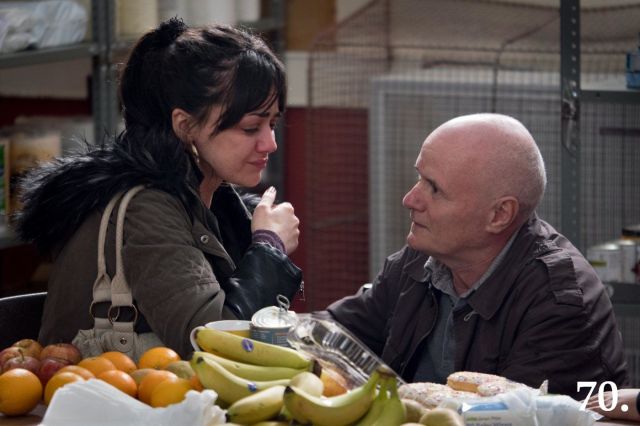
I, Daniel Blake
Directed by Ken Loach (2016)
Ever since the British electorate catastrophically expressed its apparent desire to leave the European Union in 2016, the discourse surrounding the United Kingdom has tended to promote the idea that before Brexit, things were going swimmingly. Ken Loach’s Golden Palm winner I, Daniel Blake, which premiered at the Cannes Film Festival a month before the fateful vote, can serve as a relentlessly bleak corrective to that self-congratulatory myth. Based on the experiences of British job seekers and job centre employees, the naturalist drama recounts a man’s Sisyphean struggle to navigate the thicket of regulations and obligations that keep him from receiving the benefit payments he, recovering from a heart attack, should by rights be entitled to. I, Daniel Blake is a bloodcurdling howl of anger at the injustice of a state that has allowed its public services to be hollowed out and sold for scrap under the guise of promoting individual liberty.

Timbuktu
Directed by Abderrahmane Sissako (2014)
Based on the brief 2012 Islamist occupation of the famed Malian city that gives the film its name, Timbuktu is an understated drama of manners that manages to transcend the stylistic trappings of conventional terrorism cinema. It’s drenched in melancholy and world-weariness, yes, but director Abderrahmane Sissako is keenly interested in the humanity of the situation, which he recognises as harrowing and absurd at the same time. As a result, the film deftly mixes wryly comedic moments with scenes of hope – the shreds of ordinariness the besieged populace stubbornly holds on to, the lack of commitment among the jihadists – and, inevitably, the horrors of violent oppression.

Star Wars: The Last Jedi
Directed by Rian Johnson (2017)
There are many reasons why the eighth entry into Star Wars‘ main series – the “Skywalker Saga” – is the best Star Wars film to date, from the the vivid character arcs to the incredible cinematography to the long overdue and thematically resonant concretisation of the Force, the Star Wars universe’s guiding philosophical principle. Most impressively, however, The Last Jedi is the rare studio blockbuster that openly challenges its own franchise, and by extension its fans: writer-director Rian Johnson offers a conscientious engagement with the knotty notion of male heroism his film’s predecessors espoused and successfully subverts it in a way that is fully in line with Star Wars lore. It proved a polarising move, leading some portions of the audience to angrily reject Episode VIII wholesale, but it made for a bold artistic vision that urged fandom and franchise alike to stop clinging to the past and to appreciate that there is both value and entertainment to be found in pushing forward.
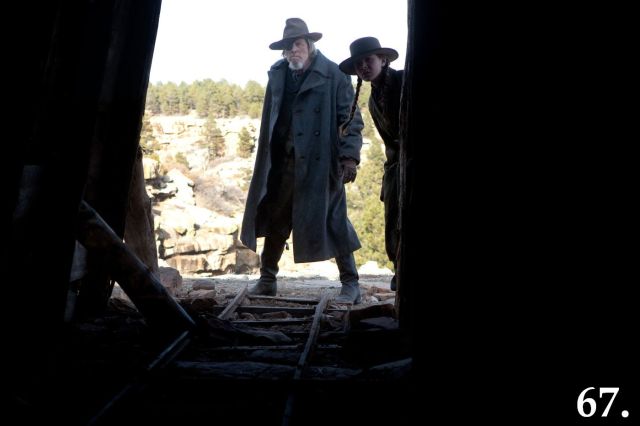
True Grit
Directed by Joel and Ethan Coen (2010)
For the better part of 50 years, the western seems to have found itself in the awkward position of constantly being declared dead. But while its heyday is definitely long gone, it still has the potential to stun – as exemplified by the Coen brothers’ earnest and resoundingly successful attempt to faithfully translate Charles Portis’ 1968 novel True Grit to the big screen. With its laconic genre revisionism and bleak vision of the American frontier, the novel – all but forgotten after its Hollywoodified first adaptation won John Wayne his only Oscar in 1970 – turns out to be a perfect fit for the Coens’ brand of subversive Americana. True Grit, which sports two brilliant lead performancess by Jeff Bridges and then-newcomer Hailee Steinfeld, is essentially their own take on John Ford’s The Man Who Shot Liberty Valance – an elegiac western swansong that is under no illusions that the era it bids farewell to was one of glory and heroism.

Raw
Directed by Julia Ducournau (2016)
There probably wasn’t a debut feature this decade capable of going toe to toe with Julia Ducournau’s gloriously unappealing cannibal drama in terms of sheer gleeful brazenness. Set at an off-puttingly brutalist veterinary school in a particularly bleak corner of Belgium, Raw runs the taboo-smashing gamut from flaming red rashes to glistening flesh wounds to close-ups of a bikini-waxing job gone wrong without ever feeling exploitative. Rather, Ducournau seems to be making a purposeful statement here: by highlighting her inexplicably voracious heroine’s corporeality in the starkest possible manner, she is countering 120 years of the male camera gaze, recoding the female body from a stalked object of lust to a radically experiencing subject on the prowl.

Inception
Directed by Christopher Nolan (2010)
In hindsight, it seems like Inception was the last large original, non-IP blockbuster to leave an enduring pop-cultural footprint – from the debates surrounding the final shot’s pseudo-mystery (it was clearly toppling) to the ostentatious storytelling device of dreams folded into dreams, which has led to any kind of layered narrative being inevitably compared to Inception. But for all the easy jokes that have been made at the film’s expense, it was a phenomenon that deserved every bit of its inescapable hype. To date, this star-studded piece of exciting event cinema is probably the best showcase for Christopher Nolan’s mastery at painting grittily industrial high-concept science-fiction onto an enormous canvas. May we see its like again.
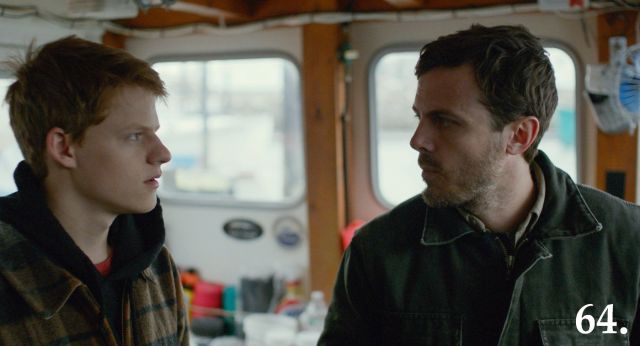
Manchester by the Sea
Directed by Kenneth Lonergan (2016)
In the hands of writer-director Kennth Lonergan, whose cinematic output’s notorious sporadicity really is unfortunate, tragedy and comedy complement each other so well that you start to wonder why so much is made of the division between the two in the first place. Manchester by the Sea is the perfect case in point for this, for although it revolves around a death in the protagonist’s family – and the long-term effects of a staggeringly traumatic earlier event – it’s imbued with a gently empathetic sense of humour, a penchant for the kind of everyday absurdism that will be familiar to anyone who’s ever found themselves cracking an unexpectedly well-received joke at a funeral. But Lonergan’s artistry does not lie in the mere existence of these deeply human moments of levity, delivered with earnest brilliance by Casey Affleck and Lucas Hedges – it’s in the way they are not just used to alleviate but also to enforce the impact of the unspeakable tragedy at hand.

The Broken Circle Breakdown
Directed by Felix van Groeningen (2012)
The decade’s best ode to country music is from Belgium, of all places. Not only does Felix van Groeningen’s fourth directing effort feature plenty of foot-tapping musical moments; the maudlin tale of the doomed love between two Flemish bluegrass musicians does not shy away from the raw emotionality that makes the songs of Hank Williams and George Jones so ripe for parody. Full of passionate love, broken hearts, strong liquor, familial bliss, cancer, death, and religious dogma, The Broken Circle Breakdown is an urgent, earthy drama whose characters have no time for half-baked sensations – and all the audience can do is sit there, let the feeling wash over it, and hum along to a hauntingly beautiful soundtrack.

Get Out
Directed by Jordan Peele (2017)
One of the best directing debuts of the decade, Get Out is a near-perfect marriage of social satire and Hitchcockian horror. Jordan Peele’s meticulously crafted plot mines the Guess Who’s Coming to Dinner set-up for all its horrific potential and smartly recontextualises its smiling white liberalism as nightmarish predatory whiteness. Much has been written in praise of this critical and commercial smash hit, and all of it bears repeating: Get Out is a timely genre gem and a dazzling demonstration of the capabilities of a master writer-director in the making.

Another Year
Directed by Mike Leigh (2010)
Favouring months-long character work with his actors over a fixed shooting script has long been a staple of Mike Leigh’s cinema, and in many ways, Another Year feels like a summation of that tried and true approach. In accordance with its title, the film chronicles a year in the life of an older couple, played by Jim Broadbent and Ruth Sheen with customary wit and heart: they work, they cook, they read, they squabble, they garden, they go to the pub, they give advice to their unmarried son, they try to help their divorced friend – played by a magnificent Lesley Manville – find love again. It’s all as unspectacular as it sounds, and the film is all the better for it. More than ever before – with the possible exception of 2008’s Happy-Go-Lucky – Leigh manages to capture the poetic beauty of the everyday without ignoring the omnipresence of tragedies big and small. It’s life and life only – and with Leigh, that’s more than enough.
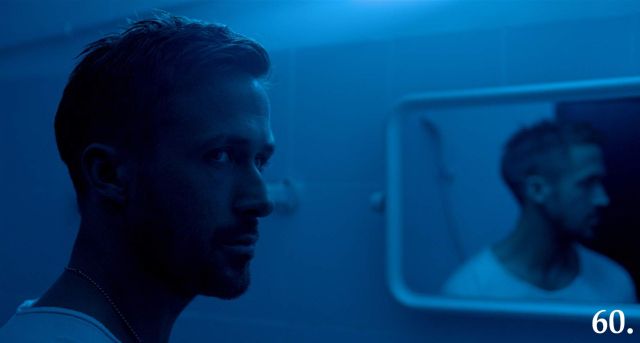
Only God Forgives
Directed by Nicolas Winding Refn (2013)
After enamouring Hollywood with Drive, his acclaimed 2011 arthouse action thriller, Danish director Nicolas Winding Refn might well have moved into a more profitable mainstream lane. Instead, he made Only God Forgives, a bizarrely surreal crime thriller with a healthy dose of horror added to the mix that somehow manages to not only evoke Luis Buñuel and David Lynch but also Thai master director Apichatpong Weerasethakul. In slow-moving scenes drenched in the neon glow of Bangkok’s seedier neighbourhoods, Refn stages a brutal cat-and-mouse game between a despondent American Muay Thai fighter (Ryan Gosling) and a sword-wielding police officer (the icily brilliant Vithaya Pansringarm), whose hyper-aestheticised, often hyper-violent imagery won’t be for everyone – but which will fascinate and haunt those willing to brave it.

The Hateful Eight
Directed by Quentin Tarantino (2015)
If True Grit is a late great addition to the revisionist western canon, Quentin Tarantino’s polarising chamber play about a group of shady characters sharing a hut in post-Civil War Wyoming is a very late, very great contribution to the spaghetti western as championed by Sergio Corbucci. Cutting down on the geographic sweep of Tarantino’s preceding work and refining the stage performance aspect of Reservoir Dogs (1992), The Hateful Eight is an effortlessly entertaining, ingeniously structured, and delightfully over-the-top exercise in letting a comprehensive rogue’s gallery of western stereotypes have at each other. It’s Agatha Christie-cum-Corbucci, and it might just be Tarantino’s pulpy masterpiece.

Gone Girl
Directed by David Fincher (2014)
It’s a match made in heaven: who could have done Gillian Flynn’s sardonic novel about a marriage gone awry more justice than David Fincher at his most surgically precise and detached? What starts out as a tense mystery about spousal resentment and murder soon spirals out of control into a bracing caper that delves deep into its protagonists’ corrosive toxicity and is fundamentally uninterested in particularly edifying conclusions. In a decade that’s had its fair share of more or less explicit Hitchcock homages – from Steven Soderbergh’s Side Effects (2013) to Paul Feig’s A Simple Favor (2018) – Gone Girl might be both the one closest to the mark and the one to play with the format in the most deliciously wicked manner.
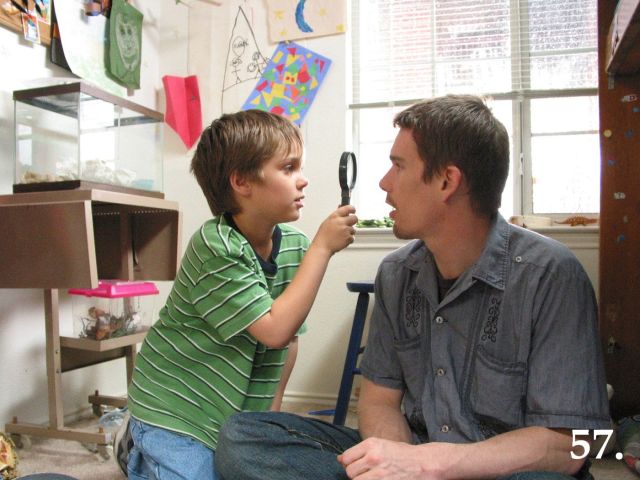
Boyhood
Directed by Richard Linklater (2014)
Surely, Richard Linklater’s twelve-year project is among the most impressive production feats in recent memory. But Boyhood, filmed intermittently between 2001 and 2013 in order to let its cast age naturally, transcends its potentially gimmicky concept. Charting his protagonist’s childhood from age six onwards, Linklater tells a moving story not just of boyhood, but – thanks to career-highlight supporting turns from Patricia Arquette and Ethan Hawke – of motherhood, fatherhood, and living with divorce as well. And beyond that, Boyhood, much like Toy Story 3 (2010), also works as a sort of generational mirror: instead of merely replicating the 2000s, it is inextricably of that time, chronicling the subtle changes in pop-culture and even cinematic convention that will no doubt resonate with large swathes of Millennials, whose formative years Linklater is committing to cultural memory here.

The Wind Rises
Directed by Hayao Miyazaki (2013)
Originally intended to be the final work of Hayao Miyazaki – a decision the Japanese anime legend has since reneged on – The Wind Rises has the air of a grand final statement, from the fantastical opening sequence of dark shapes conquering the sky as if they’d escaped from Castle in the Sky (1986) to the touching final declaration (“Live!”). Yet, the reflective mood with which Miyazaki approaches his fictionalised biography of airplane designer Jiro Horikoshi never stifles the film’s soaring and breathatkingly drawn set pieces; the observation that well-meaning people can contribute to unspeakable suffering never takes away from the film’s exulting love for art and personal expression. In short, it’s a late – but hopefully not the the last – masterpiece in Miyazaki’s incomparable career.

Sweet Country
Directed by Warwick Thornton (2017)
Not unlike Lucrecia Martel’s Zama (2017) in its radically postcolonial outlook, Sweet Country argues, more or less explicitly, against the legitimacy of the Australian state. Set in the early 20th century, the film chronicles an indigenous couple’s escape into the outback after shooting a white man in self-defense. Director and cinematographer Warwick Thornton, who manages to reflect the Australian Aboriginal concept of Dreamtime in the idiosyncratic way he paces his story, displays a keen sense of how racism and colonial subjugation are woven into Australia’s social fabric, making the country as it is fundamentally unequipped to deliver true justice. It doesn’t exactly make for an easily digestible adventure movie – least of all for Australians priding themselves in their country’s alleged liberalism – but it demonstrates how genre cinema, often used to glorify imperial ambitions, can be a vessel for profound and necessary postcolonial subversion.

Coco
Directed by Lee Unkrich and Adrian Molina (2017)
With 3-D animation becoming established to an extent where it has its own recognisable aesthetic principles, it’s hardly a surprise that the medium’s mainstream purveyors have plateaued a little bit in terms of innovation. And while Pixar’s Día de Muertos-inspired Coco does not boast the exuberant formal inventiveness of Spider-Man: Into the Spider-Verse (2018), it boasts maybe the best combination of touching storytelling and visual stylisation in the Pixar catalogue to date. Although the studio is not exactly known for its lack of colourful visuals, the musical journey of a Mexican boy into the realm of the dead feels like a revelatory confrontation with the colour spectrum’s true potential. Peopled by gorgeously variegated sets and figures borrowed from Aztec mythology and Mexican history – including a hilarious and appropriately bizarre version of Frida Kahlo – Coco is an emotionally arresting, artistically dazzling family adventure that makes you think the reports of Pixar’s decline have been greatly exaggerated.

La La Land
Directed by Damien Chazelle (2016)
An Oscar blunder of historical proportions as well as a set of widely discussed shortcomings have made sure that any discussion of La La Land as an excellent piece of filmmaking will inevitably come with a whole number of qualifiers. Yes, its inner emotional workings could be more convincing, and its depiction of jazz as a mostly white affair is less than ideal or accurate – but Damien Chazelle’s modern spin on the mid-century Hollywood musical is a rare treat nonetheless. Told through catchy songs and elaborate choreogaphies bathed in luminous colours, La La Land delivers an engaging love story with a twist and, more importantly, does so with so much infectious energy that it’s virtually impossible to not get swept up in Chazelle’s dizzying enthusiasm and breathtaking craftsmanship.

Only Lovers Left Alive
Directed by Jim Jarmusch (2013)
What’s left to do if you’ve done everything? Jim Jarmusch’s attempt to answer this purely hypothetical question in the most literal way possible yielded one of the decade’s most achingly beautiful romances: Tilda Swinton and Tom Hiddleston star as two world-weary vampires struggling with the boredom and depression that, as you’d imagine, are wont to set in after you’ve existed for a century or ten. Even by Jarmusch’s standards, Only Lovers Left Alive is light on story and heavy on mood, playing like a variation on the dreamlike poetry of Dead Man (1995), just with less movement through space. Sceptics of Jarmusch’s work won’t find much to admire here, but for those attuned to his languidly laconic style, this marvellously atmospheric vision of the vampire as a tragic ur-hipster who literally did everything before it was cool will register as a logical and beguiling extension of his career’s major concerns.

The Favourite
Directed by Yorgos Lanthimos (2018)
It’s 2019, and there are still historical dramas that treat the past like a museum artifact sitting in a glass showcase – seen from a distance, effectively dead. However, in a post-The Favourite world, it suddenly seems plausible to dream of a future where such stuffy costume fare is no longer the guiding mode. There simply cannot be a way back after Greek auteur Yorgos Lanthimos’ third English-language film, based on an extraordinary script by Deborah Davis and Tony McNamara and featuring a devastating lead performance from Olivia Colman, took the murmurings surrounding Britain’s Queen Anne and her feuding female attendants and turned them into an abrasively funny and surprisingly human cross between an 18th-century court intrigue drama and a lesbian sex comedy. For all the carefully placed anachronisms – from all too quotable insults to an unforgettable dance scene – The Favourite‘s history feels lived-in and immediate and unlike anything this genre has seen before.
Ernest & Celestine
Directed by Stéphane Aubier, Benjamin Renner, and Vincent Patar (2012)
Steeped in good-natured humour and a disarmingly uncynical earnestness, this Franco-Belgian adaptation of Gabrielle Vincent’s hugely popular series of picture books delivers 80 minutes of understated watercolour whimsy. With its episodic structure, unassuming plotting, and unwaveringly straightforward moral compass, Ernest & Celestine recalls the beautiful low-key adventures of the Studio Ghibli classic Kiki’s Delivery Service (1989) and thus serves as a refreshing throwback to the more leisurely animated fare of yesteryear – though the story of the unlikely friendship between an artistically minded mouse and a gourmand bear also makes an effective child-friendly case against xenophobia and cultural isolationism, inuring the film against any potential accusations that it deals in regressive nostalgia.

Us
Directed by Jordan Peele (2019)
Get Out (2017) may be the neater of Jordan Peele’s two directing efforts. But while its stylistic virtuosity is in service of a fairly cogent thesis, Us, whose formal merits are at least on par, is even more unsettling: deploying the age-old horror trope of the murderous doppelgänger, Peele doesn’t obviously gesture in an ideological direction, though psychoanalysts and theorists of class and race can find plenty of material here. Instead, he favours an uncanny open-endedness that keeps in place a pervasive sense of dread until the very end. Most intriguingly perhaps, Us seems to challenge the specifically American notions of national exceptionalism and manifest destiny, as both its title and its pivotal line, uttered by the main antagonist (“We’re Americans”), suggest an America that has either escaped its mainstream’s notice or which has been systematically been written out of the conversation. In 2019, this is nothing if not timely.
Leviathan
Directed by Lucien Castaing-Taylor and Véréna Paravel (2012)
A frighteningly immersive, viscerally immediate ethnographic documentary shot with a collection of waterproof GoPro cameras, Leviathan is so unflinching in its water-soaked hyper-realism that at times it almost bends back into surreal horror. Lucien Castaing-Taylor and Véréna Paravel seem to chart every inch on, around, and even under an industrial-sized fishing trawler combing the Atlantic, bearing witness to the ritual slaughter of hundreds, if not thousands of fish each and every day, catching glimpses of the people who make a living this way, coming to understand the monstrous boat as a deadly beast for some animals and a floating sanctuary for others. It may be a film about animal rights on some level, but Leviathan‘s intentions are far murkier than that – grasping for deeper truths in the unfathomable vastness of a world that is never anything less than harsh, unforgiving, and punishing.
Inside Llewyn Davis
Directed by Joel and Ethan Coen (2013)
From A Serious Man (2009) to The Ballad of Buster Scruggs (2018), the Coen brothers have come to routinely lay waste to the persistent preconception that their work is uniformly characterised by postmodern irony and frenzied madcap humour – and the tender, markedly downcast Inside Llewyn Davis is an especially engaging example. It’s a work of wintry melancholy, set against the blossoming folk revival in New York’s Greenwich Village, with the emphasis lying not on the countercultural community spirit invoked in the music of Bob Dylan and Joan Baez, but on how even this supposed pocket of utopian revolutionaries has been invaded by American capitalism: although the movie features plenty of angelic renditions of beautiful songs, its titular anti-hero’s quest isn’t for the perfect album or the next great folk song but for the money necessary to keep him off the street. Yes, this odyssey is absurdly funny at times – also thanks to a stellar supporting cast – but in the main, it’s a sobering illustration of just how wide the chasm between living and making a living actually is.
The Florida Project
Directed by Sean Baker (2017)
Told from the perspective of a rambunctious six-year-old (a revelatory turn by Brooklynn Prince), who lives with her mother in a cheap motel, The Florida Project is an empathetic portrayal of American poverty, set among the resplendently candy-coloured strip malls surrounding Orlando’s Disney World. The irony is not lost on Sean Baker, who casts said capitalist Mecca as an overshadowing absence, which exists only by inference – in the form of nightly fireworks, tourist helicopters, and lost parkgoers – while his child protagonists roam the “wilderness” of abandoned condos and discontinued park annexes. But beneath its sharp insights into the cyclical nature of poverty and inequality, The Florida Project is, first and foremost, a vivid, empathetic, and subtly sad coming-of-age drama that feels utterly original.
Ash Is Purest White
Directed by Jia Zhangke (2018)
Not the most structurally ambitious project Chinese director Jia Zhangke undertook this decade – that would be 2015’s Mountains May Depart – but arguably the most emotionally complex, Ash Is Purest White continues his series of artfully probing enquiries into 21st-century Chinese society. With a star-crossed love story told over roughly ten years at the centre of his film, Jia explores how the recent large-scale developments in China’s polity and economy encroach on the private sphere, how they turn every human connection into a transaction of sorts, and how these changes doom some to stay behind in the dust of history. In Ash Is Purest White, Jia delivers the most striking example yet that he is the master of finding poetry in the sociopolitical.

Toni Erdmann
Directed by Maren Ade (2016)
Toni Erdmann is many things – a dry satire about capitalist alienation; a gentle drama about mending a dented father-daughter relationship; an indictment of how the former Eastern Bloc has essentially become a farming ground for western corporations; a mumblecore comedy about people in awkward situations; and it stars Peter Simonischek as a blithe party and business lunch crasher sporting false teeth and a ridiculous hairpiece. On paper, the individual parts of this 160-minute oddball stunner really shouldn’t work in conjunction – but somehow, German writer-director Maren Ade pulls all of these threads together and combines them into a sprawling, thematically tight, and emotionally affecting existentialist farce that needs to be seen to be believed.
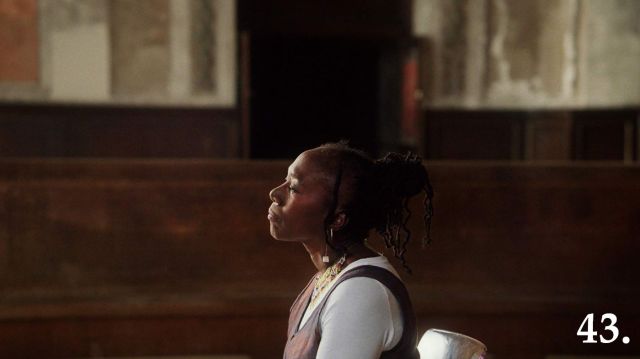
13th
Directed by Ava DuVernay (2016)
If you thought the 13th amendment to the United States constitution, introduced in 1865 following the Civil War, ended American slavery outright, Ava DuVernay’s disheartening yet essential documentary will set you straight: 13th illustrates how the amendment’s inclusion of an exception to the law – stipulating that slavery is acceptable as a from of punishment for conviction of a crime – played a crucial part in ensuring that the antebellum-style oppression of African-Americans, particularly in the South, continued through Reconstruction and ultimately informed the formulation of the infamous and devastating Jim Crow laws. DuVernay pulls no punches in laying out the case how the legal end to slavery had limited effect on the systemic and institutional disenfranchisement of black people in the United States and how the Reconstruction Era’s slavery-like practices set the stage for the so-called war on drugs, mass incarceration, the success of private prisons, and the scourge of anti-black police brutality. Released almost a month to the day before the 2016 presidential election, 13th may well have been intended as a wake-up call to the prospective America of Hillary Clinton. Instead, it became a prologue of sorts – a portrait of an institutional rot of which Donald Trump is only a symptom.

Burning
Directed by Lee Chang-dong (2018)
On the surface, Lee Chang-dong’s adaptation of a Haruki Murakami short story, which in turn harks back to a William Faulkner story, is a captivating mystery drama about a woman’s disappearance and a man’s attempts to find her. Upon closer inspection, however, Burning‘s eminently political project shifts into focus: with mesmerisingly minimalist intensity, Lee explores the numerous ways in which men feel they’re entitled to women’s attention and affection, with little to no regard for female agency and personhood. It’s a remarkably subtle film, full of nuance and with a fine eye for detail, helped by the brilliant interplay of actors Yoo Ah-in, Steven Yeun, and Jeon Jong-seo, that cements the status of South Korea’s film scene as perhaps the most vibrant force in world cinema today.

The Rider
Directed by Chloé Zhao (2017)
If you can think of a symptom of toxic masculinity, a western has most likely perpetuated it at some point. More than perhaps any other genre outside action and pornography, it thrives on essentialist notions of masculinity that have no time for such “feminine” distractions as self-doubt, caring for other people, or not doing something simply because it’s the “manly” thing to do. With the awe-inspiring The Rider, Chinese-American director Chloé Zhao offers a poignant and stirringly elegiac counter-narrative, featuring a cast comprised of non-professional actors playing only slightly fictionalised versions of themselves. As she portrays an injured rodeo rider from a South Dakota reservation struggling with the prospect of not being able to ride again, Zhao diligently unpacks the cross-generational pain the reductive “a man’s gotta do what a man’s gotta do” ethos inflicts on men and women alike – without ever losing sight of why this destructive archetype still has so much traction.

Howl
Directed by Rob Epstein and Jeffrey Friedman (2010)
By loosely translating their specialties – documentary filmmaking, a keen interest in all things San Francisco, and shining the spotlight on queer issues – into a biopic format, Rob Epstein and Jeffrey Friedman gave legendary Beat poet Allen Ginsberg the jazzy, partially animated, partially not-even-really-about-Ginsberg non-biopic he probably would have wanted. Constructed around an interview with Ginsberg (played by James Franco), his first public reading of “Howl” – arguably his magnum opus – and the landmark obscenity trial his publisher and fellow poet Lawrence Ferlinghetti had to face because of it, Howl is the rare movie about poetry that displays a profound understanding of the medium’s intrinsic dynamism and is made with enough adventurous conviction to let that knowledge influence the formal level. Whoever finds themselves watching this deliriously enchanting ode to the transformative power of literature will emerge with a new appreciation for the intricacies of the written and spoken word.
Kulenkampffs Schuhe
Directed by Regina Schilling (2018)
Inexplicably, this German made-for-TV documentary has yet to make its way beyond the German-speaking world, even though the international community – cinematic and otherwise – could learn much from its essayistic approach to how fascism can persist in a democratic society. Reading her father’s troubled biography in parallel with those of post-war Germany’s foremost TV entertainers – two Wehrmacht soldiers, one Holocaust survivor – writer-director Regina Schilling paints a picture of a thoroughly traumatised nation unable to parse its rivalling feelings of denial, shame, and displaced pride about its Nazi past. The conclusions are less than edifying, as the influence of Hitler has worked its way down through the generations into the present, which is why, Kulenkampffs Schuhe seems to suggest, anti-fascist sensibilities are more necessary than ever.

BlacKkKlansman
Directed by Spike Lee (2018)
As unsubtle an assault on Donald Trump’s America as a great director’s work can be, Spike Lee’s adaptation of an outrageous memoir – written by a black police officer about his over-the-phone infiltration of a Ku Klux Klan chapter in the 1970s – is part catharsis, part rallying cry, part caustic buddy comedy, capped by an ingenious, if violently startling, epilogue that underscores the need for films like BlacKkKlansman. Lee cuts right through the pathological bothsidesism of contemporary discourse and lets loose a fierce antiracist satire fuelled by righteous fury at a culture still struggling to see the difference between “white power” and “black power” and to identify white supremacists and neo-Nazis as such if they’re not openly chanting racist slogans – and sometimes even if they do.
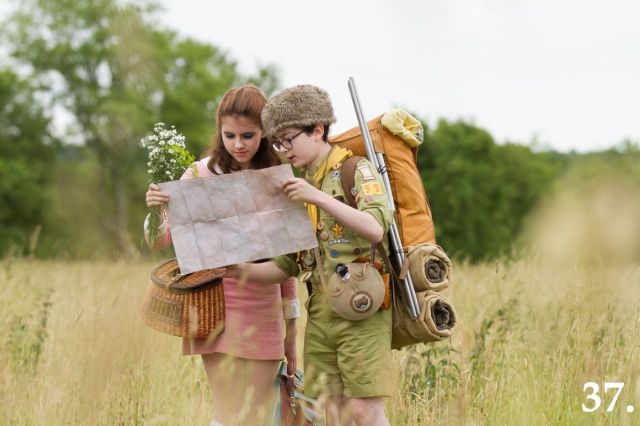
Moonrise Kingdom
Directed by Wes Anderson (2012)
Never mind the meticulous stylisation Wes Anderson has continued to perfect over the last ten years: beyond its intricate compositions, gorgeous late-summer yellows and browns, and typically skewed lines of dialogue, Moonrise Kingdom is as heartfelt and honest a coming-of-age story you could imagine. The 1960s-set New England adventure about the elopement of a rogue boy scout and a stylish fantasy enthusiast brims with twee tween nostalgia, prepubescent angst, and the genuinely affecting feeling of a childhood summer gone all too quickly. While many were – and some of them still are – quick to condescendingly deem Moonrise Kingdom a whimsical exercise, the canny marriage of style and substance is the work of a major artist.

Annihilation
Directed by Alex Garland (2018)
After tackling the crux of human-like artificial intelligence in his subtly subversive 2014 directing debut Ex Machina, screenwriter and novelist Alex Garland followed up with an even more brilliant, even more unsettling science-fiction project. While Annihilation, adapted from Jeff VanderMeer’s eponymous novel, may look like a traditional alien-encounter narrative – prompting some to accuse it of dealing in tired clichés – it gracefully undoes our expectations: for one, the alien presence encountered by its scientist protagonists, who set off on a Heart of Darkness-like trek into an “infected” swamp area, seems to be neither good nor evil – it merely changes things, which comes to be the film’s central metaphor. In essence, Garland explores how people deal with change – be it physical, psychological, or even molecular – and how we can manage to live with the knowledge of our inevitable death. The results, invoking everything from David Cronenberg to Virginia Woolf and modern dance, are too numerous and strange to recount, but suffice to say that this haunting masterpiece of science-fiction horror gains in complexity and beauty upon every rewatch.

Gangs of Wasseypur
Directed by Anurag Kashyap (2012)
It’s been called “India’s Godfather,” but Anurag Kashyap’s sweeping two-part crime epic has far more to do with the stacked casts, rippling causalities, and narrative flourishes of a Martin Scorsese gangster film than with the more solemn tones of Francis Ford Coppola. Over the course of five hours that pass in a flash, Kashyap – filming outside the constraints of the Bollywood system – works his way through 60 years of Indian independence as experienced by the feuding clans of the Wasseypur neighbourhood in the eastern city of Dhanbad. There are too many characters to count, too many reasons for revenge, and too many shifting loyalties – and yet, Kashyap manages the feat of keeping it all on track, so that when the final confrontation explodes in all its stylised glory, the conclusion is not just thrilling but emotionally rewarding. In a decade where cinema increasingly felt the pressure from the small screen’s serialised formats, Gangs of Wasseypur served as a welcome reminder of the sheer scale cinema is capable of.
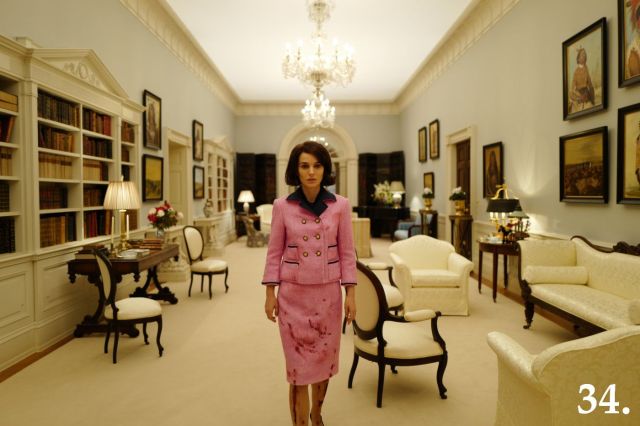
Jackie
Directed by Pablo Larraín (2016)
If the art of political myth-making is as old as governmental structures themselves, Pablo Larraín makes a convincing case for its current mode having been coined with the state funeral of President John F. Kennedy in 1963. Portraying Jacqueline “Jackie” Kennedy’s post-assassination trauma through her frantic attempts to cement – or maybe just retroactively establish – the legacy of her husband’s imperfect presidency while her own political influence is quickly dissipating, Jackie is a sharp, uncannily beautiful mixture of sly political satire and genuine character drama – both invested in the title character’s complex emotional geography and fully conscious of the absurdity of the Kennedy White House styling itself as the second coming of Camelot. Natalie Portman gives a career-best performance as Jackie walking that precarious line, while Mica Levi’s haunting score consistently translates the film’s pared-down biopic trappings into something more reminiscent of horror.

Zero Dark Thirty
Directed by Kathryn Bigelow (2012)
The politics of Kathryn Bigelow’s exhaustive journalistic thriller about the search for and raid of Osama bin Laden’s hiding place are thorny. There’s no way around that. Good-faith arguments can be made against the way Zero Dark Thirty frames the role that torture played in the hunt for the infamous al-Qaeda leader, whose death in 2011 was ultimately of more short-term symbolic than long-term practical use in the international fight against global terrorism. But the film is also far less gung-ho about the United States’ military engagements across the world than its most ardent detractors contend. Rather, Zero Dark Thirty is a key work about the “Forever War” – an unflinching and unfailingly engrossing effort to chart the toxic effects of America’s self-imposed mission to act as the world’s police officer, leaving its body politic and its military in a constant state of trigger-happy paranoia and normalising the slow hollowing out of human rights.

The Irishman
Directed by Martin Scorsese (2019)
Going into the 2010s, Martin Scorsese was already untouchable as one of the greatest directors of cinema history – but he obviously wasn’t going to let that stop him from continuing to innovate: he dabbled in 3-D in Hugo (2011); The Wolf of Wall Street (2013) was a fiercely contemporary skewering of American greed; Silence (2016) put the spiritual aspect of his work into razor-sharp focus; and that’s not even mentioning his insightful documentaries on George Harrison and Bob Dylan. This year, this remarkable run was capped by The Irishman, Scorsese’s 210-minute behemoth of a crime drama, which refines and deepens the themes of his famed mafia canon – an intricately constructed reflection on power, violence, and the emptiness a life dedicated to those things eventually amounts to. Imbuing the world of GoodFellas (1990) and Casino (1995) with the spiritual and emotional force of Silence, The Irishman stands tall in the Scorsese canon as a multi-faceted, deeply moving, towering yet nimble masterwork.

Drive
Directed by Nicolas Winding Refn (2011)
Born under the tropics of Jean-Pierre Melville’s Le Samouraï (1967) and John Boorman’s Point Blank (1967), Nicolas Winding Refn’s taciturn action drama about a getaway driver’s entanglements in the Los Angeles underworld is 21st-century genre cinema at its finest – in conversation with the past throughout, but cognizant of the need to move on. In Drive, this means subtly reframing the neo-noir’s lone-wolf protagonist, ceasing to fully contrast him with his criminal opponents’ unbridled brutality and subscribing to the view that he carries the very same violent impulses within him. While this is not entirely new – Boorman and Melville approximated the point, and even Don Siegel’s Dirty Harry (1971) is not entirely unamenable to that reading – Refn’s alluring subversion lies in how he negotiates the problematic morality of rooting for such a figure: even though Drive‘s nameless Driver, played by an eerily steely Ryan Gosling, comes to stand firmly on the right side of proceedings, his actions are startlingly devoid of glorification, leaving the audience to ponder what kinds of values and expectations classic genre cinema has fostered in us.

The Look of Silence
Directed by Joshua Oppenheimer (2014)
It may be the less eye-catching part of Joshua Oppenheimer’s documentary diptych about the large-scale massacre of alleged communists that took place in Indonesia in the 1960s – after all, 2012’s The Act of Killing was constructed around a group of perpetrators staging glorifed reenactments of their deeds, comfortable in the knowledge that in contemporary Indonesia, their killings are the stuff of revered legend. But while The Act of Killing is undeniably shocking, The Look of Silence is decidedly more evocative, and ultimately more human, than its predecessor. It features an optometrist paying a series of visits to those who carried out the killing of his older brother during the pogroms of 1965, conducting eye exams on the now-elderly murderers and asking them about his brother’s fate. Not only is this astonishingly courageous filmmaking – large portions of the Indonesian crew are only billed as “Anonymous” for fear of persecution – it’s an essential portrait of guilt, inherited trauma, and, in spite of the human horror on display, a stubborn sense of hope: it’s not the lack of remorse on the part of the unpunished murderers that stands out in The Look of Silence – it’s their children’s genuine sense of shock when confronted with their parents’ past; the hope that the children will defy their parents.
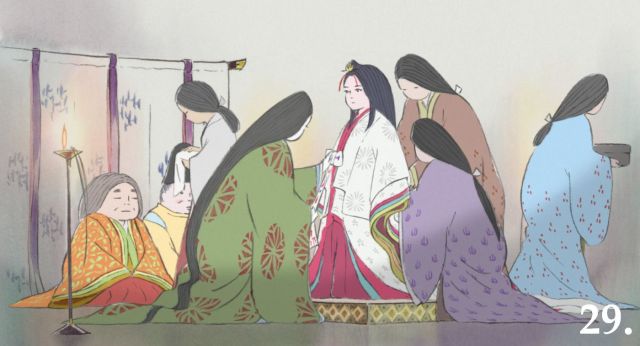
The Tale of the Princess Kaguya
Directed by Isao Takahata (2013)
If Hayao Miyazaki is Japanese animation’s perfectionist grandmaster, his friend and fellow Ghibli co-founder Isao Takahata, who died in 2018 at 82, was its prime experimenter. After using animation to tell war tragedies (Grave of the Fireflies) and Ozu-inspired family dramas (Only Yesterday) and bringing a comic strip aesthetic to the big screen (My Neighbors the Yamadas), his final film found him refining his craft even further. Based on the oldest extant Japanese narrative – the 10th-century Tale of the Bamboo Cutter, in which a farming couple finds a baby inside a bamboo stalk – The Tale of the Princess Kaguya resembles an old-school fairytale in the best of ways: it’s divertingly episodic, meandering through a rich fantasy-imbued world; it’s unapologetically strange in its frequent mythical invocations; yet its themes – the inevitable passage of time and the lost innocence of childhood – are universal enough to make the tale a truly stirring affair. Add to that the exceedingly beautiful art style that mixes watercolour drawings with abstract charcoal strokes, and you are left with a late masterpiece of one of animation’s greatest-ever artists.

Her
Directed by Spike Jonze (2013)
The 2010s have long occupied a special place in the popular consciousness. Throughout the 1980s and 1990s, this was the far-but-not-too-far-off decade one could project one’s wilder futuristic fantasies onto: Back to the Future Part II (1989) dreamed of hover skateboards in 2015; The Running Man (1987) conceived of a totalitarian American dictatorship in 2017; and much has been made this year of finally having reached the date given in Ridley Scott’s Blade Runner (1982). Her, whose story about a lonely man falling in love with his near-human computer operating system is itself set somewhere around 2030, taps into this discourse by reflecting on essential contemporary fears born not only out of real-life technological advances, but also out of this pervasive anxiety of pop-culture: the question is no longer just what constitutes a human being, but whether we are on the brink of having to expand the very definition of humanity. Accordingly, Her doesn’t so much judge its protagonist’s devotion to a disembodied voice fronting for an intricate piece of programming as it accompanies him on his – and his virtual partner’s – complex emotional journey. The impact of this moving and endearingly off-beat science-fiction drama is certainly helped by the fact that director Spike Jonze is using it to allegorise his erstwhile marriage to Sofia Coppola; but Her‘s true brilliance lies in its visionary treatment of humanity in the age of the intelligent machine.

Scott Pilgrim vs. the World
Directed by Edgar Wright (2010)
Some 35 years after the popularisation of the video game, cinema still struggles to satisfyingly appropriate the art form – at least in the form of direct adaptation. In terms of translating the medium’s visuals and sensibilities into cinematic fare, however, there is a clear precedent of success: Edgar Wright’s Scott Pilgrim vs. the World, which is based on a six-volume series of graphic novels by Bryan Lee O’Malley, follows a quest-based plot – with the titular Scott Pilgrim having to defeat his new girlfriend’s seven evil exes in arcade game-style combat – and expects nothing less of its audience than being able to consistently parse an overabundance of stimuli. Indeed, given the sheer amount of visual and narrative cues Wright packs into nearly every outrageously embellished frame, it’s not an exaggeration to call Scott Pilgrim an onslaught on the senses. But therein lies its ingenuity and its exciting sense of innovation: by mashing up the information-brokerage strategies of film, video games, and comic books, this hilarious comedy becomes an energetic multimedia experience that, even nine years on, feels truly groundbreaking.

Call Me by Your Name
Directed by Luca Guadagnino (2017)
The greatest love story of the 2010s bar one, told with the sumptuous sedateness of a glorious summer’s day, Call Me by Your Name is the cinematic equivalent of leafing through a photo album and finding oneself confronted with the fragments of a past self. Dipping in and out of scenes, cutting short moments, abruptly switching locations, director Luca Guadagnino and writer James Ivory sketch the formative summer fling between a precocious 17-year-old, played by the revelatory Timothée Chalamet, and his father’s 24-year-old graduate student (Armie Hammer) – a pointilist approach that gradually coalesces into a transcedently beautiful portrait of youthful passion and love. Try as one might, there is only so much about this film’s many merits that can be conveyed through words, for Call Me by Your Name – as one would expect from one of the decade’s, the century’s eminent screen romances – is not a work to read or hear about, but one that demands to be delved into, to be surrendered to, to be felt.
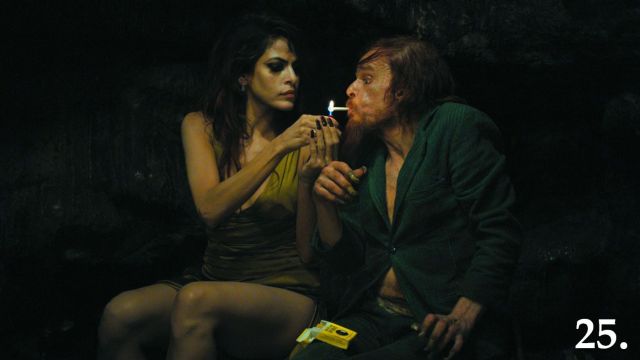
Holy Motors
Directed by Leos Carax (2012)
Mysterious, elegiac, and consistently irreverent – Leos Carax’s bizarre reflection on the nature of film, mixed into a mournful farewell tribute to his late wife Yekaterina Golubeva, who died in 2011, is one of the decade’s great cinematic experiments. Conducted with the confidence and the swagger of a director who has long since sworn off appealing to conventional tastes, Holy Motors feels like an even more surreal companion piece to Cosmopolis (2012): it, too, makes ample use of a stretch limousine’s interior; and much like David Cronenberg, Carax surrounds his enigmatic lead – Denis Lavant, at the mercy of an awe-inspiring makeup and prosthetics department – with iconic actors grappling with their own legacies, from a boisterous Michel Piccoli to a stunningly unreadable Édith Scob. But whereas Cronenberg sets his sights on capitalism and the slippery nature of meaning itself, Carax’s two-hour drive through Paris, which is punctuated by vignettes from seemingly different movies, ponders cinema’s precarious situation in the digital age – replete with gorgeously illogical imagery, sly allusions, transcendent musical numbers, and its fair share of infectiously childish moments of glee. It’s a cliché at this point to say that “a movie has everything,” as is calling a film “like nothing you’ve ever seen before” – but if there was a work in the 2010s that warranted both of these descriptions, it would be Holy Motors.

Happy as Lazzaro
Directed by Alice Rohrwacher (2018)
Catholicism is an important aspect of Italian director Alice Rohrwacher’s work, and its influence is nowhere as palpable and as intriguing as it is in her quasi-Marxist parable Happy as Lazzaro. Starring the saintly Adriano Tardiolo as a put-upon farmhand on a secluded tobacco plantation, the film takes its audience on a dreamlike journey whose true dimensions are revealed only gradually, defying expectation at every turn, and which seamlessly switches between the gritty naturalism of Bicycle Thieves (1948) and Francesco Rosi’s striking Christ Stopped at Eboli (1979) and a magical, or rather biblical, component that cares little for conventional logic. Indeed, Happy as Lazzaro is a work of extraordinary, visionary grace: Rohrwacher is clearly in touch with tradition – be it cinematic, religious, or folkloristic – but she never seems bound by it, setting a magnificent example for a cinema that knows where it’s coming from but which, crucially, also has a clear idea of where it is going.

A Separation
Directed by Asghar Farhadi (2011)
With Abbas Kiarostami and Mohsen Makhmalbaf in exile, Jafar Panahi jailed and banned from working, and Samira Makhmalbaf functionally on hiatus, 2011’s A Separation came as a small token of comfort – a sign that the Iranian New Wave, one of world cinema’s most creative arenas, had survived the increased political repression after the contested Iranian presidential election of 2009. Asghar Farhadi, who had previously distinguished himself with his social dramas Fireworks Wednesday (2006) and About Elly (2009), may specialise in more conventional storytelling than a Kiarostami or a Panahi, but that doesn’t take away from the fact that A Separation remains one of the best-acted, most emotionally taxing, most harrowing dramas of the decade. What begins as the story of a middle-class couple’s separation – due to the husband’s unwillingness to emigrate because that would mean leaving his Alzheimer’s-stricken father behind – soon turns into a fierce custody battle, in which the class divide between the couple and their hired nurse becomes an essential factor. It’s a film built around nuances and grey areas, resulting in a complex portrait of contemporary Iranian society, whose very cohesion seems to be in danger of being pulled apart at the seams by religious dogma and unforgiving institutions that do not allow for the country’s fundamentally diverse nature. In A Separation, the private is very much political.

A Ghost Story
Directed by David Lowery (2017)
A decidedly slow tone poem about the enormity of time that might also be making a point about Millennials’ fraught relationship with homeownership, A Ghost Story is the kind of art film that’s ripe for parody but that also has the potential to have a profound impact on those who let it. In fact, the film’s central aesthetic conceit is a good litmus test to ascertain which side of the divide one might fall on: if one is able to embrace a film whose titular ghost – a dead musician shunning the next world in order to silently and invisibly haunt his and his wife’s house – is depicted as a figure shrouded in a Halloween costume-like bedsheet with two eyeholes, David Lowery’s melancholy magic might stand a chance. The reward is a quiet, narratively minimalistic, visually stunning soul’s journey that expertly negotiates between the sublime dread of being an all but invisible speck in space and time and an appreciation for the stubborn significance of the smallest acts of creation and love.
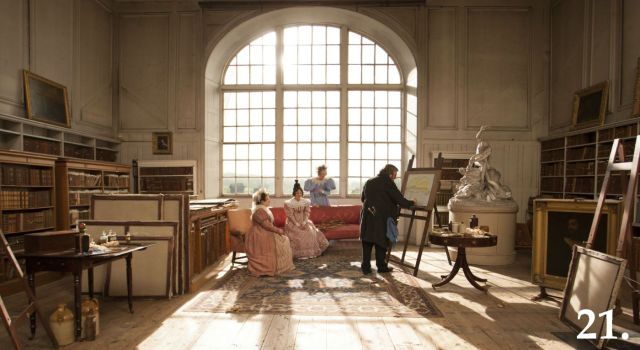
Mr. Turner
Directed by Mike Leigh (2014)
At first glance, Mike Leigh does not seem like the man to bring to the screen a dramatisation of the life of Britain’s foremost 19th-century painter, J. M. W. Turner – given his predilection for improvisation, creative freedom, and modest production values. But as Mr. Turner makes clear, it’s all about treating the excursion to the early Victorian era just like any other Mike Leigh joint: relying on his usual stock company – led by a fantastic Timothy Spall as wily curmudgeon Turner – and grounding the story in loosely connected anecdotes and immersively authentic period dialogue, the veteran director conjures up one of the most vibrant visions of England in the 1830s and 1840s that has ever graced historical cinema. Mr. Turner succeeds because it realises that its subject, presented in isolation, would be dangerously uninteresting, creative perlocutions or not (“I shall cogitate upon’t!”). So Leigh focuses on Turner’s numerous interactions with his contemporaries – chance encounters, assorted intellectuals of the day, his fellow painters, his patrons, his father – in order to tell the story of a country, a world, in the midst of radical, irreversible change, exemplified by a painter embracing abstraction against the backdrop of nascent photography and new calls for artistic realism.

You Were Never Really Here
Directed by Lynne Ramsay (2017)
It’s frankly amazing what Scottish filmmaker Lynne Ramsay did with Jonathan Ames’ novella about a traumatised ex-soldier vainly seeking redemption in busting child prostitution rings as a gun for hire. It’s not that Ames’ spartan, seedy book is bad in any way – the impressive thing is how Ramsay turned it from a rather matter-of-fact tale of corruption, political and human, into a hypnotic and moving meditation on masculinity, guilt, female agency, and the true effects of violence. A taut, impressionistic thriller, You Were Never Really Here features little to no graphic violence, with Ramsay skirting cheap thrills and making the far more interesting decision to linger over the preparation and the aftermath of bloody altercations – their echoes reverberating through the film in the form of Jonny Greenwood’s superb score and Joaquin Phoenix’s lumbering, imposing lead performance as a tough guy who only just manages to conceal a wounded psyche that may be beyond repair. A lesser film might have turned its attention to how this state of things begets chaos and carnage – in fact, Todd Phillips’ Joker (2019), also starring Phoenix, did just that whilst leaning heavily on Ramsay’s otherworldly aesthetics. But Ramsay knows that would be too simplistic: You Were Never Really Here may be a neo-noir thriller, but it is uncompromisingly invested in its characters’ humanity, their empathy, and the life-and-death matter of forging meaningful interpersonal connections.

Like Someone in Love
Directed by Abbas Kiarostami (2012)
When Iranian writer-director Abbas Kiarostami died in the summer of 2016 at the age of 76, cinema lost a true giant – one of its most inquisitive minds and perhaps its most playful explorer of the uneasy relationship between lived reality and artistic representation. It’s fitting, and not a little sad, that the Tokyo-set drama Like Someone in Love ended up being Kiarostami’s final narrative feature – though that may well have been his intention, given that the film, which he directed with the help of a translator, was originally titled The End. It’s fitting and sad because Love is an eerily strange film, a bold new spin on Kiarostami’s long-standing fascination for human interaction: the story, centred on a sex worker’s visit to an octogenarian sociology professor, may feel like an abstraction, an unfinished sketch, but there is little doubt that this is a deliberate choice, for the film is peppered with moments of raw emotional power – all of which derived from the characters’ repeated failures to establish a symmetrical connection with each other. Ostensibly a straightforward drama about urban loneliness, generational gaps, and economic hardship, Like Someone in Love is also a subtly tragic nightmare of the breakdown of all communication. Kiarostami’s narrative career could hardly have ended on a more thematically poignant and emotionally striking note.

It’s Only the End of the World
Directed by Xavier Dolan (2016)
In the first decade of his career, 30-year-old Québécois directing boy wonder Xavier Dolan made a whopping eight films, most of them revolving around family dysfunction and queer identity in oppressive surroundings. And while they are all worth a watch – Tom at the Farm (2013) and Mommy (2014) especially – 2016’s It’s Only the End of the World, which found itself at the receiving end of many a critical drubbing, remains his underappreciated masterpiece. Adapted from Jean-Luc Lagarce’s eponymous play about a gay playwright returning home to tell his high-strung family about his impending death of cancer, it’s a perfect distillation of everything that makes Dolan’s cinema so distinctive: it’s close, often uncomfortably close, to its characters, who all but have to squeeze past the prying camera; it’s intensely, and loudly, pervaded by snapshot memories set to unbearably catchy pop songs; and it lays bare the violence of sexual and emotional repression through enthrallingly dialogue-heavy scenes whose mood can radically switch at the utterance of an unfortunate turn of phrase. Armed with an all-star cast of French-speaking cinema – starring Gaspard Ulliel, Nathalie Baye, Vincent Cassel, Mario Cotillard, and Léa Seydoux – It’s Only the End of the World is not only an unforgettable chamber play, but Dolan’s best, most fascinatingly open-ended take on how the family unit is both a safe haven and a stifling prison cell.

First Reformed
Directed by Paul Schrader (2017)
As close to the spiritual rigour of Ingmar Bergman and Carl Theodor Dreyer as perhaps any movie on this list, Paul Schrader’s unforgivingly bleak drama about a dying priest’s crisis of faith may well be the decade’s definitive cinematic treatise on how humanity is stumbling, seemingly inexorably, towards its own self-inflicted downfall. With astonishing narrative and aesthetic simplicity, Schrader lays bare the intricate web of connections between capitalism and climate change and their effects on society – most notably disillusionment, superstition, political apathy, and religious dogmatism – as exemplified by a Protestant church beholden to corporate values rather than the Christian creed of charity and radical love. The scene where Ethan Hawke’s protagonist, channelling Claude Laydu in Robert Bresson’s Diary of a Country Priest (1951), tells a group of schoolchildren about his church’s role in the Underground Railroad alone speaks volumes about the sheer absurdity of the 21st century’s booming megachurch business. First Reformed never minces its words or images, yet it also never gives in to overwrought literalism, resulting in a film that displays nothing but respect for any form of spirituality, but which at the same time argues that the spiritual is inextricable from the concerns of the physical world.

Portrait of a Lady on Fire
Directed by Céline Sciamma (2019)
Art, history, femininity, and queerness all intersect in the decade’s most brilliant romance: sporting an all-female cast of characters, living in an estate mansion on a windswept Breton island during the 1700s, Portrait of a Lady on Fire is both a masterpiece of gradual, devastatingly subtle emotional build-up buzzing with hints of unexpressed passion as well as an elaborate rumination on the power of the gaze and how artistic representation not only keeps alive memories but eventually supplants the things being remembered. This interweaving of raw emotion and sociopolitical considerations has been a mainstay of Céline Sciamma’s incredibly exciting career so far – which includes the acclaimed coming-of-age dramas Tomboy (2011) and Girlhood (2014) – and in Portrait, she deploys all of her strengths to breathtaking effect: her immaculate sense of style is reflected in Claire Mathon’s extraordinary cinematography; her rapport with her actors is palpable in the multi-layered performances from Noémie Merlant, Adèle Haenel, and Luàna Bajrami; and her pared-down screenplay, which chooses its words with the utmost care, ranks among the most incisive in recent memory. If it wasn’t clear before, Portrait firmly establishes Sciamma as a peerless voice of contemporary cinema.

This Is Not a Film
Directed by Jafar Panahi and Mojtaba Mirtahmasb (2011)
If Jafar Panahi’s arrest, jailing, and subsequent house arrest and ban from filmmaking – following his support for the Iranian opposition movement – had signalled the end of his career, he would still be remembered as one of his country’s finest directors, having made a number of notable and widely acclaimed films like The Mirror (1997), Crimson Gold (2003), or Offside (2006). But of course, he hasn’t stopped: since 2011, he’s made four films in secret, fully aware that being caught would likely see him be returned to one of the Iranian regime’s infamous prisons – an act of artistic resistance that has transformed Panahi into a revered global symbol for freedom of expression. This Is Not a Film is the first of these clandestine projects – it made its way to the Cannes Film Festival by way of a flash drive that was smuggled out of Iran hidden inside a birthday cake – and it chronicles Panahi’s state of legal limbo as he waits for a court’s decision on his future. Set entirely inside his Tehran apartment, which he is not allowed to leave, the documentary shows him doing menial tasks, making phone calls, working on a new script, planning scenes, watching and discussing his old movies with his friend, DP, and partner in crime Mojtaba Mirtahmasb. There is staging involved – Panahi is a director, after all – but it’s about the inability to stage, to control the set, the cast, and the production, and the impossibility to tell a cinematic story without cinematic means. Reduced to the bare creative essentials, Panahi uses his secret platform to make a stirring statement about art rebelling against the yoke of totalitarianism.

The Social Network
Directed by David Fincher (2010)
It has been called “the Internet era’s Citizen Kane,” and the connection really isn’t that far-fetched. In just under two hours, David Fincher’s electric adaptation of probably the best screenplay Aaron Sorkin has ever written runs – but never rushes – through the expansive early history of Facebook, capturing the excitement, the arrogance, and the male entitlement that pervade virtually every tech giant’s origin story, and unpacking how an American culture steeped in the ideologies of Thomas Edison and Henry Ford always defaults back to greed, envy, and social Darwinism. The Social Network both championed and perfected this approach to the digital age, essentially dooming any later attempt, from Jobs (2013) to The Fifth Estate (2013), to seem stale and uninspired by comparison. This is all the more impressive because in its way, this is old-school filmmaking – a classic cautionary tale of success, hubris, and alienation – adapted to fit into a thoroughly modern thematic framework. For all the talk about Fincher being a distinctively contemporary director – not least because of his unabashed embracing of digital cameras – The Social Network, just like Gone Girl (2014), reveals him to be very much in touch and in tune with the concerns of classic Hollywood. A new Citizen Kane indeed.

Under the Skin
Directed by Jonathan Glazer (2013)
Britain’s most enigmatic active director took a thinly veiled satire on factory-farming – Michel Faber’s novel Under the Skin – and turned it into something much more mysterious and terrifying. Stripping away such prosaic luxuries as classical narration and elaborate characterisation, he took Faber’s premise and followed it to its logical conclusion: Jonathan Glazer’s Under the Skin is the story of an alien, chillingly played by Scarlett Johansson, coming to terms with life on Earth – and it makes a fascinating, and arguably successful, attempt at looking at humanity through a truly alien lens. As Johansson wanders the streets of Glasgow in search of men to lure into her surreally otherworldly lair, the audience is treated to the eerie, often horrific vision of perceiving human beings as a merely incidental presence, as a larger version of the common ant, essentially. Faber’s vegetarian outlook is still in there, but Glazer cleverly shifts the film’s perspective to make a deeper point about humanity at large – how do we define ourselves, being but sentient flesh? – and, even more intriguingly, about femininity and the social construction of gender: Johansson’s alien may pose an existential threat to the human race, but what it comes to learn about misogyny and rape culture is far more harrowing than any science-fiction scenario.

A Pigeon Sat on a Branch Reflecting on Existence
Directed by Roy Andersson (2014)
Not many filmmakers embody the concept of “sui generis” as perfectly as Swedish director-turned-advertiser-turned-director Roy Andersson: there is no mistaking his strangely hyperreal sets and unusually pale makeup choices, nor has anyone mastered – or even attempted – the vignette as much as he has. Like all of his post-2000 work, A Pigeon Sat on a Branch Reflecting on Existence is a compilation of static shots which – with one notable exception – correspond to one scene, many of them isolated incidents. Andersson doesn’t develop themes in the usual way – even less so than in 2000’s Songs from the Second Floor, which inaugurated this format – but they emerge in the conversation between these thoroughly odd non-sketches; grand and all-encompassing thoughts about the absurdity of life, the horrors of colonialism, and the folly of war, packed into the immovable mundanity of a nightmarishly flat Gothenburg, where two funerary joke article salesmen battle an unenthusiastic clientele and Swedish King Charles XII visits a bistro en route to conquer Russia. This is cinema at its most bewilderingly, beautifully incomparable.
Paterson
Directed by Jim Jarmusch (2016)
Although he is generally hailed as one of American independent cinema’s greatest off-beat poets, Jim Jarmusch’s perhaps best-ever work might actually be his least weird one. Indeed, Paterson is almost comically simple, even by Jarmusch’s minimalist standards: it’s as gentle and slice-of-life as a comedy-drama can be – an understated homage to William Carlos Williams’ epic poem “Paterson,” depicting a week in the life of an amateur poet named Paterson, who works as a bus driver in, of course, Paterson, New Jersey. But this simplicity is deceptive, for while Paterson is a charmingly low-key affair from start to finish, it is also a profoundly moving film of staggering spiritual beauty. Consisting of a series of small gestures and vignettes from Paterson’s everyday life – most of them variations on each other, mimicking the repeating patterns of a working life – the film is a quietly uncynical celebration of the mundane and its artistic potential, with Jarmusch offering an enchantingly unassuming vision of what personal fulfilment might look like. In Paterson, great art need not be a grand public affair, nor does it become less great if it cannot be one’s full-time occupation – it can be the poem inspired by a box of matches, the lyric composed in the laundromat, or the dress one has turned into a black-and-white expression of one’s individuality. Rarely has an ode to life’s little joys been so unpretentious, so tender, and so utterly, utterly wonderful.
The Turin Horse
Directed by Béla Tarr and Ágnes Hranitzky (2011)
Partially prompted by the hostile environment Hungary’s far-right government had created for the arts, Hungarian directing legend Béla Tarr, in an act of both political protest and artistic control, declared The Turin Horse to be the final work of what he calls “the Béla Tarr brand” – the longstanding group of creatives consisting of Tarr himself, writer László Krasznahorkai, musician and actor Mihály Vig, and his wife, editor, and co-director Ágnes Hranitzky. Naturally, such a radical measure will lend a special aura to the film designated to be such an esteemed collective’s swansong, but even in Tarr and Hranitzky’s explicitly apocalyptic œuvre, which includes Damnation (1988) and the seven-hour Sátántangó (1994), The Turin Horse stands out as a decidedly literal confrontation with the end of all things. It’s set in and around a lonely cabin situated in a small, barren vale at the mercy of an interminable wind, while the two protagonists, a disabled farmer and his daughter, live in arduous, repetitive misery that is exacerbated once the resources they need in order to make a living start to disappear. Over the course of some 140 minutes, divided into just 30 stunning black-and-white shots, Tarr and Hranitzky detail the slow dissolution of life itself, punctuated by scenes of outsiders ransacking the farm or raving about the state of the world with an almost gleeful righteousness. Is The Turin Horse a reverse Genesis, in keeping with the prologue’s invocation of Friedrich Nietzsche, or does it update Sátántangó‘s post-Communist dystopia to fit the quasi-fascism of contemporary Hungary? Whatever the reading one eventually settles on, there is no question about the effect of this forceful final statement: it’s the gloriously uncompromising work of a group of visionary artists who have changed cinema for the better.

The Other Side of Hope
Directed by Aki Kaurismäki (2017)
Finnish auteur Aki Kaurismäki made two films in the 2010s, both of them about immigration – one in the abstract, one in as concrete terms as his unmistakably deadpan style allows. The first was 2011’s Le Havre, the story of a Gabonese boy looking for passage to England by way of the titular port city, styled after the dramas of Marcel Carné – as droll and touching and latently socialist as any of Kaurismäki’s works, but largely divorced from any political specificity. Six years later, when The Other Side of Hope won the Best Director prize at the Berlin Film Festival and Kaurismäki announced that he was done with directing, the world had changed, and, it seems, specificity had become inevitable: yes, Hope may feature a typical Kaurismäki protagonist – an unsuccessful shirt salesman trying his hand at running a restaurant – but he shares the spotlight with Sherwan Haji, a Syrian-Finnish actor playing a coequal main character whose escape from the Syrian Civil War has stranded him in Finland. This is not a film about the war, strictly speaking – Kaurismäki knows that this is beyond him and not his story to tell. But it is a film about immigration: set in a markedly more multicultural Helsinki than one is used to from this director, Hope, without ever diminishing the seriousness of the subject matter, draws a shrewd parallel between Kaurismäki’s usual concerns – alienation, loneliness, existential angst – and the modern immigrant experience, from the Kafkaesque administrative struggles to the ever-present danger of xenophobia and violent racism. In less skilled hands, this laconic fairytale would probably have veered into the tasteless, especially considering that this is another film where Kaurismäki celebrates the restorative power of drinking beer, smoking a cigarette, and listening to live music. But Hope is the work of an underappreciated master, who understands both the limitations and the potential of himself and his material and doesn’t hit a single false note.

Certain Women
Directed by Kelly Reichardt (2016)
In her achingly empathetic sixth feature, Kelly Reichardt casually plays with the conventional power dynamics of the literary adaptation, giving the mode a refreshing and rewarding spin. Using three short stories from the collections of Maile Meloy as its basis, Certain Women essentially compiles a cinematic story cycle by loosely connecting their disparate characters and broadening their outlook from being primarily concerned with relationships to providing a more holistic take on femininity in small-town Montana. In three successive chapters, Reichardt tells the story of a lawyer (Laura Dern) and her unfortunate client who has trouble listening to women, an abrasive mother (Michelle Williams) struggling with the lack of support she receives from her husband and teenage daughter, and a lonely horse tender (Lily Gladstone) who falls in love with an evening school teacher from out of town (Kristen Stewart). There are shades of Kenneth Lonergan in the stylised naturalism of the subdued dialogue; the implicit social commentary evokes Mike Leigh and Agnès Varda; and Guy Clark’s folk odes to the mundane are a constant presence – but the earthy, lived-in poetry of Certain Women is Reichardt’s (and Meloy’s) alone. An intimate, small-scale drama about the everyday challenges of life, specifically women’s lives, that is finely attuned to the significance minuscule moments and offhanded gestures can have, this is as rich a heartland drama as American cinema has seen over the past ten years. And yet, the fact that Certain Women, at $1.5 million at the box office and a net loss of half a million dollars, is Reichardt’s highest-grossing film to date speaks volumes about the chances afforded to films like this and directors like Reichardt. When you go to the cinema in the 2020s, be sure to support unassuming, quietly breathtaking independent films like this whenever you can.

I Am Not Your Negro
Directed by Raoul Peck (2016)
Soon after the decade began, white people the world over suffered a rude awakening from the dream of an actualised post-racial America that Barack Obama’s election had inspired in 2008. Be it the bald-faced racism endured by the 44th President of the United States, the highly publicised killings of African-Americans at the hand of the police and self-styled vigilantes, or the broader debates about diversity, representation, and institutional racism – the years after 2010 demonstrated in the starkest possible terms just how relevant the words of American writer and intellectual James Baldwin (1924–1987) still are. It is this knowledge that underpins Raoul Peck’s essayistic documentary I Am Not Your Negro, which is entirely comprised of passages from Baldwin’s writings and clips from his public appearances, where he fervently made the case for antiracist activism and argued for the need to recognise and dismantle the insidious, historically ingrained Western notion that whiteness is the norm. Peck’s film is rigorously structured, building its case trenchant point by trenchant point, drawing invaluble parallels between the Civil Rights Movement of 1960s – where Baldwin worked with the then-controversial black activists Medgar Evers, Martin Luther King Jr., and Malcolm X – and the 2010s, whose own activists, most notably the Black Lives Matter movement, are often erroneously derided by the white commentariat for being “more divisive” than their now-enshrined forebears. I Am Not Your Negro isn’t a substitute for actually reading and engaging with Baldwin, but by putting his writings into a 21st-century context, it might cause some still caught in the post-racial fantasy to reconsider their distrust of those in pursuit of true justice. As Baldwin himself famously put it: “Not everything that is faced can be changed. But nothing can be changed until it is faced.”
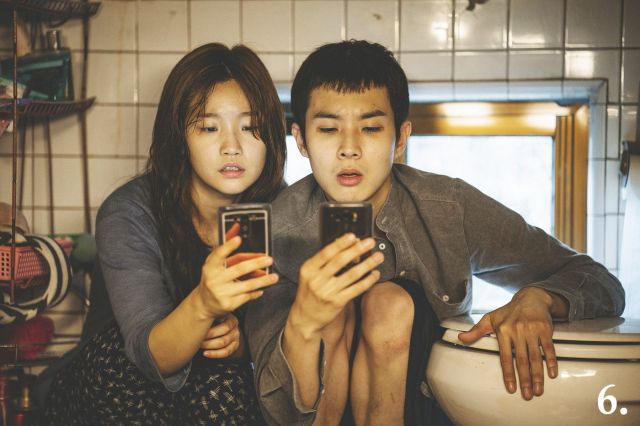
Parasite
Directed by Bong Joon-ho (2019)
Watching Bong Joon-ho’s Golden Palm winner multiple times is like taking apart an expensive watch: at first glance, you are struck by the immediate impact – it looks good, it performs its function well, and it generally seems to be in perfect working order. Once you get inside it, however, it becomes clear just how intricately arranged all the individual parts are, how every cog and every wheel interlock to make it tick just right – but there’s also a little engraving somewhere telling you that the watch was made in a country infamous for substandard labour laws. So when it’s put back together again – at third glance, so to speak – you still appreciate the elegant outward sheen, and you have great appreciation for the minute handiwork involved, but you also feel enraged at the horrors of global capitalism. Such is the brilliance of Parasite: it’s as perfect a dark comedy-tinged thriller as one could imagine – a masterpiece of taut, suspenseful narration and dazzlingly functional staging, whose twists and turns send chills down one’s spine even when one knows they’re coming. Yet it’s never overwhelmed by its technical achievements, keeping its focus firmly on its gratifyingly subversive thesis that capitalism is a parasitic system that ravages the unfortunate and the oppressed and drains people of their humanity, no matter their class. Indeed, without dealing in reductive absolutes, Bong’s tale of two families delivers an incisively poignant indictment of capitalism as an all-encompassing system – rather than a straightforward personal choice – that divides and conquers through its fostering of egotistical greed and corrosive tribalism. As we’ve seen time and again throughout this list, 2010s cinema had revolution on its mind – and it kept the best for last.

Roma
Directed by Alfonso Cuarón (2018)
Chronicling a year in the life of a middle class family’s indigenous live-in maid, played by the fantastic newcomer Yalitza Aparicio, Roma feels like director Alfonso Cuarón’s personal take on Joyce’s Ulysses or Siodmak and Ulmer’s People on Sunday (1930), in that it captures the look, feel, sound, and emotional geography of a very specific time and place through a highly immersive kind of subjective realism. The year is 1970, the place is Mexico City’s Colonia Roma neighbourhood, and Cuarón conjures it up in breathtaking vivacity: few scenes go by without three or more things happening at once; and the multi-layered soundscape, the crisp black-and-white photography, the elaborate production design, and the ingeniously deployed special effects effortlessly create the illusion of seeing one of the world’s great megalopolises through the eyes of someone in danger of getting lost in it. Drawing on memories of his childhood nanny, Cuarón places Yalitza Aparicio’s taciturn, observant Cleo at the moral and emotional centre of this gigantic stage, where she weathers not just the storms of her own life, but also those of her employers, their children, and her errant boyfriend – making this also a paean to the oft-ignored and notoriously unpaid emotional labour of care work. This interweaving of the historical and the personal is of considerable thematic import: Guillermo del Toro, in a viral Twitter thread, has intriguingly called Roma a mural – a work of art that recognises that life can only be understood in context, that it’s the connections between people, the intersections of the private and the public that generate subjecthood. It is filmmaking on an impossibly grand scale, made viscerally intimate – which is exactly what classics of the medium are made of.

It Follows
Directed by David Robert Mitchell (2014)
The 2010s were a great decade for horror, with films like Jennifer Kent’s The Babadook (2014), Robert Eggers’ The Witch (2015), Ari Aster’s Hereditary (2018), or Jayro Bustamante’s The Weeping Woman (2019) – among many, many others – playing with genre boundaries and leaning into horror’s almost unlimited potential for potent social commentary. However, perhaps no film embraced and implemented that potential as fully as It Follows, the sophomore feature of American director David Robert Mitchell. The John Carpenter-style nightmare vision of a shapeshifting entity stalking its victims at a walking pace is abjectly terrifying, but that pervasive atmosphere of dread is undergirded by a compelling exploration of Millennial angst and a very American brand of collective paranoia. Set in a predominantly white Detroit suburb littered with contradictory temporal markers, the movie revolves around a group of college-age late-teens on the cusp of adulthood unable to set off into the world on their own: they’re stuck in their absent parents’ vaguely bedraggled houses, working dead-end jobs and taking university courses, safe in the knowledge, one assumes, that none of this will ever lead anywhere because the opportunities just aren’t there. Combined with the explicitly sexual nature of the supernatural threat – the stalking curse is passed on by having sex – which draws on everything from vestigial Puritanism and the conservative backlash against the sexual revolution to the AIDS crisis, this coalesces into a slyly self-aware film about fear itself and how it has been a guiding principle of American culture ever since the arrival of the first white settlers. It Follows gets right at the heart of a genre that is obsessed with all the ways in which the past comes back to haunt us – but it also expands it by engaging with the very current anxiety that the future is not shaping up to be much better.
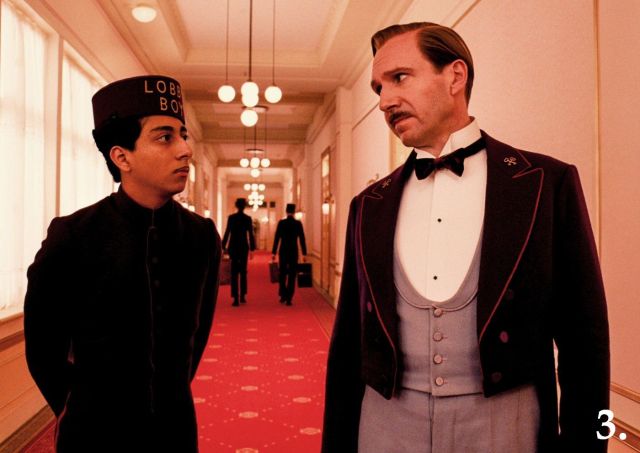
The Grand Budapest Hotel
Directed by Wes Anderson (2014)
Pop-culture has not been exactly kind to Wes Anderson, who makes for an easy target: he curates a reputation as a soft-spoken eccentric and his movies are unapologetically twee, especially when it comes to their off-beat quick-fire dialogue and pastel dollhouse aesthetics. A line from the (excellent) Netflix animated series BoJack Horseman comes to mind, where a character at one point says, “I’m going to watch a Wes Anderson movie and see if I can perceive any depth in it!” – the implication being, of course, that he won’t be able to. However, there is plenty of evidence throughout Anderson’s substantial body of work, that there is indeed considerable depth to his idiosyncratic aestheticism, nowhere more so than in 2014’s The Grand Budapest Hotel, which garnered him his first Academy Award nomination for Best Director. Sure, the first thing viewers will notice about this particular film will be the visuals: it’s shot in three different aspect ratios – each one marking a different temporal setting – and its Oscar-winning sets and costumes are a pastel lover’s most eye-popping dreams come true. From a production-value standpoint alone, The Grand Budapest Hotel is an incredible achievement. But as the obvious paintings used for establishing shots suggest, all of this artistry is merely a veneer for the darkness beneath: this may be a comedy – and an uproariously, breathlessly funny one at that, thanks in no small part to a fabulous ensemble cast led by Tony Revolori and an indelible Ralph Fiennes – but much like those made by European emigrés in 1930s Hollywood, its levity is hard-won and bittersweet. Anderson finds laughter in a fictional Central European country that is about to be taken over by this film’s version of Nazis without shirking the narrative responsibilities such an undertaking demands. It’s certainly not a coincidence that parts of the film are more or less direct adaptations of stories by Stefan Zweig – the Austrian writer who killed himself in his Brazilian exile in 1942 because he was despairing at the future of Europe. The Grand Budapest Hotel, for all its crime caper high jinks, is about that ambivalent melancholy – its potential for solipsistic elitism, its susceptibility to the deceptive allure of nostalgia, but also the genuine sadness of seeing a beloved thing disappear from the world. In the end, Anderson makes it clear that one cannot outrun fascism, one way or another. It’s a message we’d do well to heed going into the new decade.

Mad Max: Fury Road
Directed by George Miller (2015)
When Steven Soderbergh, generally considered to be one of the best American directors of the past 30 years, was asked about what he made of George Miller’s late third sequel to his own Mad Max (1979), his reply was blunt to a point where you worried for the man’s emotional well-being: “I couldn’t direct 30 seconds of that,” he said. “I’d put a gun in my mouth.” So far, so good. But he continued: “I don’t understand how he does that … and it’s my job to understand it. I don’t understand two things: I don’t understand how they’re not still shooting that film and I don’t understand how hundreds of people aren’t dead.” It may read like an overstatement, but it really isn’t: Mad Max: Fury Road is a miracle – a staggering two-hour firestorm of an action movie that relies mostly on practical effects and unbelievable stunt work; a breathless succession of increasingly reckless set pieces involving dozens of cars and hundreds of extras coordinated and edited to perfection and shot with an impeccable sense of framing and movement; a feature-length Road Runner cartoon that tears to shreds the action genre’s established gender roles; a kinetic masterpiece that serves as a poignant reminder why we call them “movies.” In a decade marked by inexorable forward strides in CGI technology, Fury Road looks like a late great hurrah of analogue awe, harking all the way back to the perfectly timed set destructions and bone-crushing acrobatics of Buster Keaton, whilst displaying a signally modern sensibility – down to its sardonic disdain for childishly cruel strongmen hell-bent on accruing power for the few at the expense of the many. It’s truly the best of both worlds – and thus more than deserving of being called one of the greatest films ever made.

Moonlight
Directed by Barry Jenkins (2016)
The best film of the 2010s is the 2017 Oscar winner for Best Picture. It’s almost funny that in a decade where the Academy got so many things so outrageously wrong – from honouring Tom Hooper over David Fincher in 2011 to Green Book (2018) and Bohemian Rhapsody (2018) emerging as the 2019 ceremony’s big winners – it got this one thing so gloriously right, even if it almost didn’t. But maybe that speaks to the transcendent power of Barry Jenkins’ second feature, a tender coming-of-age drama about a black boy from Miami coming to terms with his homosexuality. Like 13th and I Am Not Your Negro, Moonlight was made in 2016, in an America struggling to call unabashed racists by that name while Black Lives Matter activists were labelled terrorists; an America that would rationalise police officers killing unarmed black teenagers and would elevate a man who had called for the execution of minors to the highest office in the country before the year was out. Three years on, little has changed: that man is still President, black people are still the victims of police brutality, and the inhumane debate about queer people’s citizenship and basic humanity is still ongoing. That’s the thing with art: it rarely effects any immediate change. And yet, we do now live in a world where Moonlight exists – a film of such profound, transformative beauty, empathy, and humanity that makes it difficult to imagine how we ever got by without it, how we had to wait until now to see this story on screen. Of course, we know the reasons for why that is the case – it’s the same reasons that make a second term of the Donald Trump presidency a distinct possibility. So it’s all the more gratifying, and frankly miraculous, that Jenkins and co-writer Tarell Alvin McCraney braved the limitations of their $1.5 million budget to turn their script into a deeply moving story of family, friendship, and love, an essential act of cinematic representation of contemporary African-American life, and one of the most visually gorgeous films released this decade. Consequently, Moonlight is not just a sharp reflection of and a gently determined counter-narrative to one of the most disheartening periods in modern American history: the fundamental empathy of Jenkins’ vision, its very existence, the fact that it grossed over 40 times its budget at the box office, and yes, its triumph at the 2017 Oscars can serve as beacons of hope. Great art is good at that.



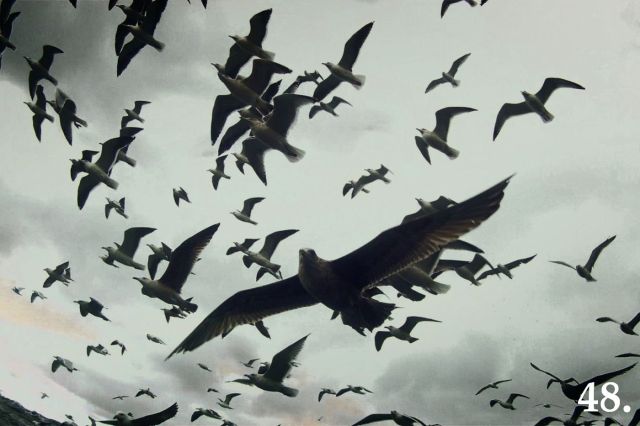






Bravo! Your reviews are a delight to read even if the films have not been seen.
Thank you very much! 🙂
Pingback: From Our Members’ Desks (Dec. 30, 2019) | Online Film Critics Society